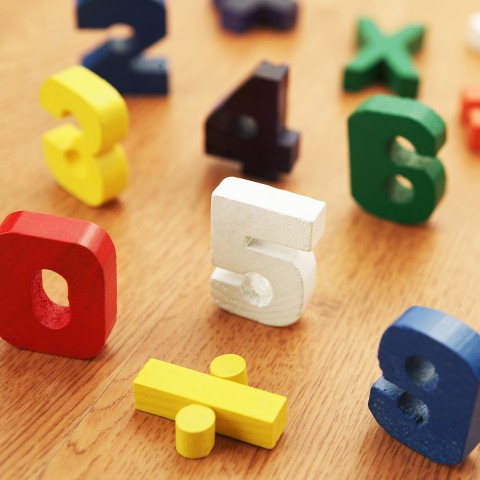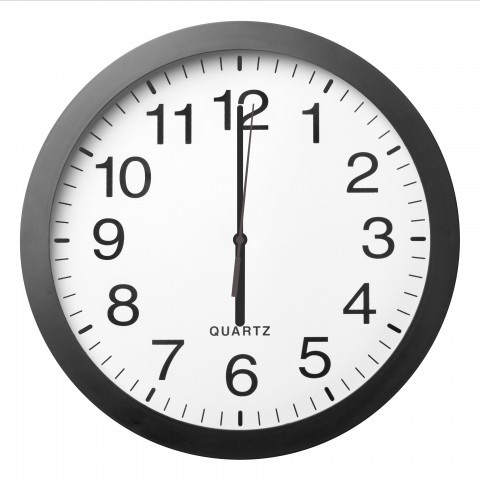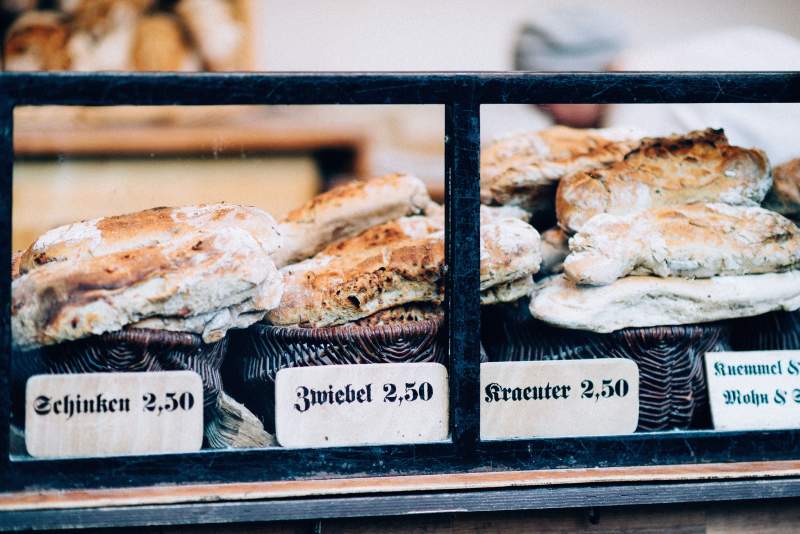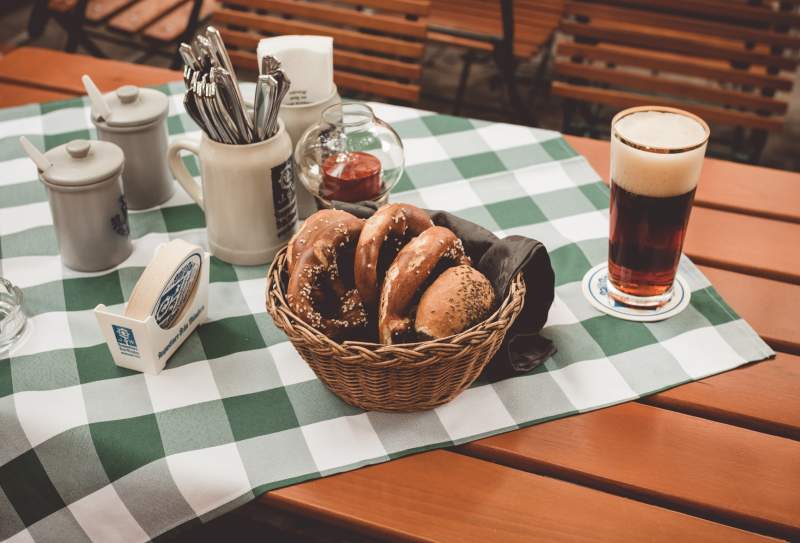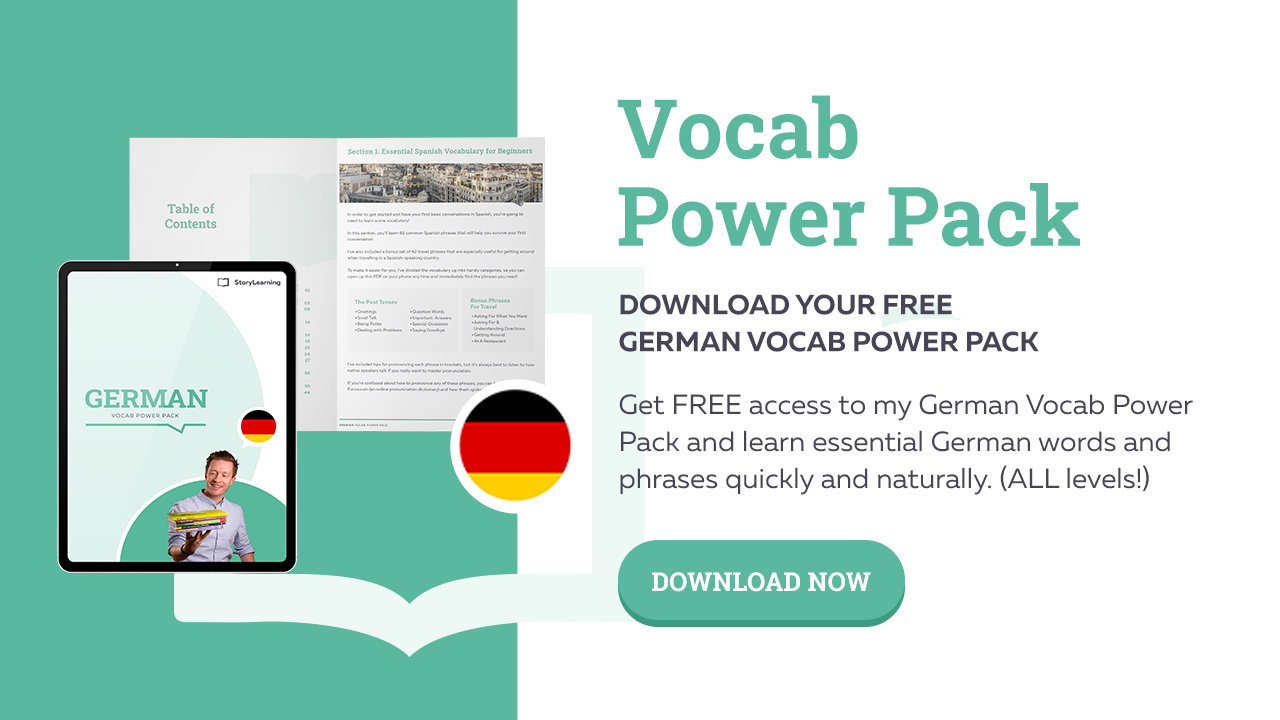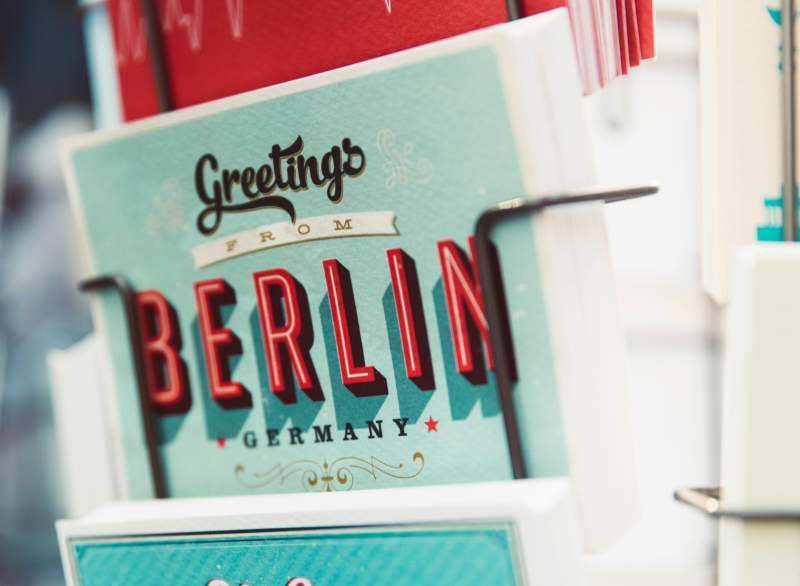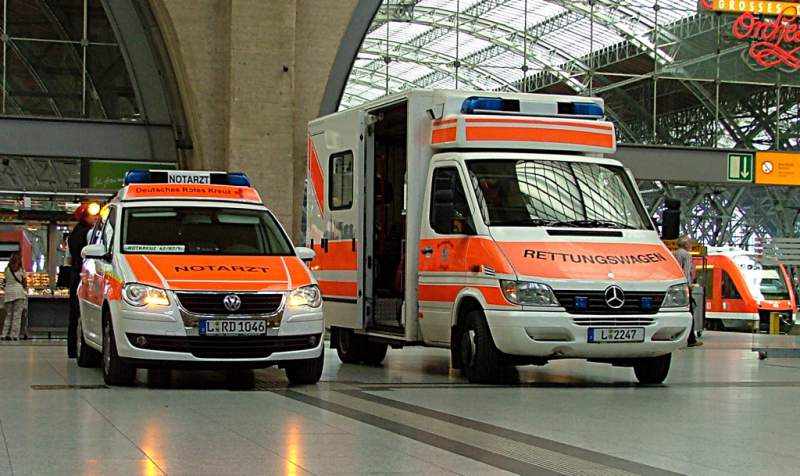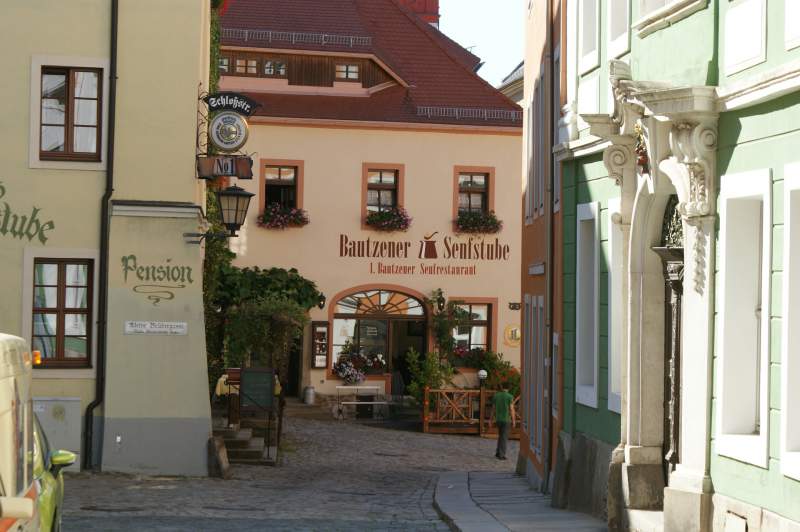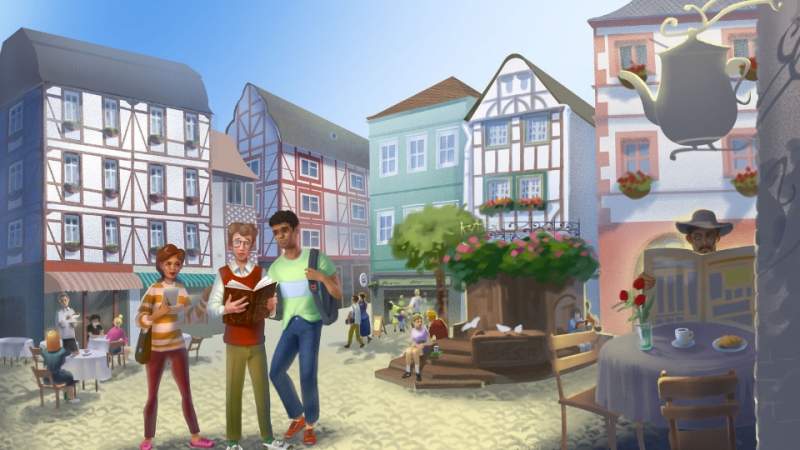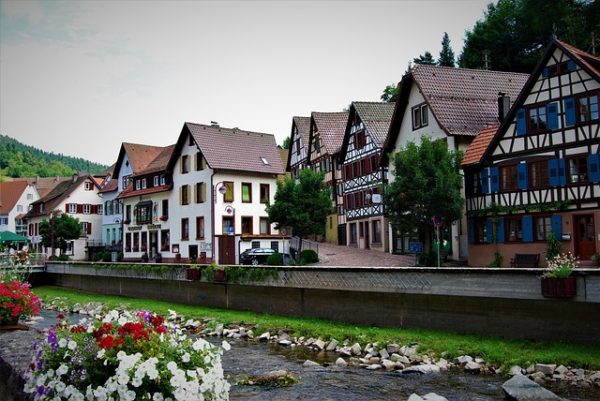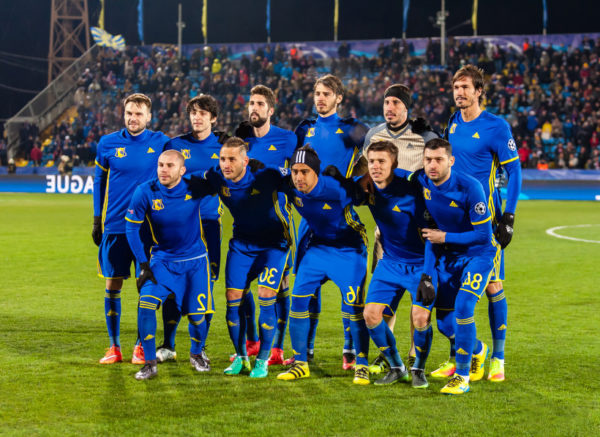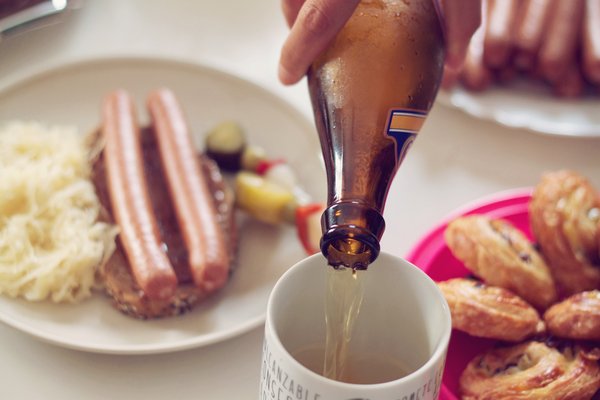If you’ve just started learning German, you might be struggling to get past the beginner stage.
Maybe you feel overwhelmed by the Germanic umlauts on vowels (ä, ö, ü), or maybe that eszett letter (ß). Perhaps it’s the pace of spoken German that’s made you question your decision to start learning.
While there’s definitely truth to those concerns, worry not. There are several short and easy-to-learn words in German that can serve as a springboard while you become familiar with the language.
Memorizing even a few basic German words for beginners will be enough of a stepping stone to help you eventually learn more. This is because many German words are composed of several shorter words that, when combined, have a unique meaning.
Take Kühlschrank, for example. This word is composed of Kühl- which means “cool,” and -schrank which translates to “cupboard.”
Combine the two and you get “cool cupboard,” which is a funny way to describe a refrigerator—the actual meaning of the word Kühlschrank.
Pretty relieving to know this, right?
German isn’t that hard after all. The most difficult part is to summon up the courage to begin.
That’s why we took the time to put together a categorized masterlist of the most essential words in German for beginners.
Without further ado, let’s get right into it…
Table of Contents
- Pronouns
- Numbers
- Nouns
- Verbs
- Adjectives
- Conjunctions
- Others
- Conclusion
1. Pronouns
The first set of words you should add to your German vocabulary are pronouns. These are the words we use to refer to people, places, or things without actually using their names:
- Susan ate the chocolate bar. = She ate the chocolate bar.
Here, we’ll be covering three types of pronouns in German: personal, demonstrative, and interrogative.
Personal Pronouns
We’ll start with personal pronouns, given their importance in sentences. These are crucial for almost any sentence, and we recommend you memorize them by heart before you start with any other words.
| English | German |
| I | ich |
| you | du |
| he | er |
| she | sie |
| it | es |
| we | wir |
| you (plural) | ihr |
| they | sie |
| me | mich / mir |
| you | dich / dir |
| him | ihm / ihn |
| her | ihr |
| us | uns |
| them | ihnen |
Demonstrative Pronouns
Demonstrative pronouns are especially critical for indicating which objects or people you’re referring to in your dialogue. These four basic German words are important to master at the beginner stage.
| English | German |
| this | dieses |
| that | das |
| these | diese |
| those | jene |
Interrogative Pronouns / Question Words
Interrogative pronouns, or the “Five Ws,” are the words we use to ask questions.
| English | German |
| who | wer |
| whom | wen / wem |
| whose | wessen |
| what | was |
| which | welche |
In a similar vein, there are a few interrogative adverbs you should learn at this stage as well:
| English | German |
| when | wann |
| where | wo |
| why | warum |
| how | wie |
2. Numbers
The numbers from one to ten in German are rather similar to those in English. Just like with most languages, learning the first ten digits will help you understand and easily learn the rest of the numbers.
| Numbers | English | German |
| 0 | zero | null |
| 1 | one | eins |
| 2 | two | zwei |
| 3 | three | drei |
| 4 | four | vier |
| 5 | five | fünf |
| 6 | six | sechs |
| 7 | seven | sieben |
| 8 | eight | acht |
| 9 | nine | neun |
| 10 | ten | zehn |
3. Nouns
Nouns are one of the most important parts of speech, so you should memorize as many of them in German as you can. When used with verbs, they create a complete sentence—in a pinch, you can even use them alone to get an urgent point across! Below, you’ll find lists of beginner German nouns you should focus on right away.
Time
Time is king, especially in a country like Germany where punctuality is paramount. Learning time-related vocabulary will come in handy in your day-to-day interactions.
| English | German |
| hour | Stunde |
| minute | Minute |
| morning | Morgen |
| afternoon | Nachmittag |
| evening | Abend |
| day | Tag |
| month | Monat |
| year | Jahr |
| Monday | Montag |
| Tuesday | Dienstag |
| Wednesday | Mittwoch |
| Thursday | Donnerstag |
| Friday | Freitag |
| Saturday | Samstag |
| Sunday | Sonntag |
People
These are the words you’d learn in the first lesson of probably any German beginner copybook.
| English | German |
| butcher | Metzger (m.) / Metzgerin (f.) |
| woodman | Holzfäller (m.) / Holzfällerin (f.) |
| police officer | Polizist (m.) / Polizistin (f.) |
| doctor | Arzt (m.) / Ärztin (f.) |
| nurse | Krankenpfleger (m.) / Krankenschwester (f.) |
| firefighter | Feuerwehrmann (m.) / Feuerwehrfrau (f.) |
| teacher | Lehrer (m.) / Lehrerin (f.) |
| father | Vater |
| mother | Mutter |
| sister | Schwester |
| brother | Bruder |
| Mr. | Herr |
| Ms. | Frau |
Places Around Town
If you’re traveling in Germany, whether in one town or around the country, these words will help you get by and even ask for directions.
| English | German |
| hospital | Krankenhaus |
| supermarket | Supermarkt |
| school | Schule |
| downtown | Innenstadt |
| university | Universität |
| city hall | Rathaus |
| main square | Hauptplatz |
| bank | Bank |
| museum | Museum |
| restaurant | Restaurant |
| café | Café |
| police station | Polizeistation |
| train station | Bahnhof |
| bus station | Bushaltestelle |
School/Office Essentials
If you have to study or work in Germany, these words will be helpful when you’re in class or at the office.
| English | German |
| pen | Kugelschreiber |
| notebook | Notizbuch |
| computer | Computer |
| pencil case | Federmappe |
| headphones | Kopfhörer |
| mouse | Maus |
| keyboard | Tastatur |
| wifi | WLAN |
| charger | Ladegerät |
| cable | Kabel |
| backpack | Rucksack |
| desk | Schreibtisch |
| copybook | Heft |
Body Parts
| English | German |
| eye | Auge |
| nose | Nase |
| ear | Ohr |
| face | Gesicht |
| arm | Arm |
| chest | Brust |
| cheek | Wange |
| forehead | Stirn |
| mouth | Mund |
| chin | Kinn |
| armpit | Achselhöhle |
| abdomen | Bauch |
| leg | Bein |
| toe | Zeh |
| finger | Finger |
| ankle | Knöchel |
| hip | Hüfte |
| forearm | Unterarm |
| elbow | Ellbogen |
| wrist | Handgelenk |
Food
Germans are proud of their cuisine and German culture values eating healthy, fresh food rather than buying frozen or ready-to-eat meals. Here’s a list of words for your next grocery shopping spree.
| English | German |
| ٍٍvegetables | Gemüse |
| fruit | Obst |
| meat | Fleisch |
| milk | Milch |
| egg | Ei |
| coffee | Kaffee |
| yogurt | Joghurt |
| bread | Brot |
| bacon | Speck |
| pie | Kuchen |
| ham | Schinken |
| chicken | Huhn |
| juice | Saft |
| sausage | Wurst |
4. Verbs
As a beginner in German, you’ll greatly benefit from picking up the most commonly used verbs. Learning them together with nouns will give you a headstart when it comes to forming sentences and communicating with others.
Daily Routine Verbs
If you’re into daily journaling, doing that in German will require you to know a set of daily routine-related verbs. Here’s a list to get you started:
| English | German |
| to get up | aufstehen |
| to eat | essen |
| to drink | trinken |
| to go | gehen |
| to work | arbeiten |
| to study | studieren |
| to drive | fahren |
| to ride | reiten |
| to sleep | schlafen |
| to wake up | aufwachen |
| to hang | hängen |
| to do laundry | Wäsche machen |
| to nap | ein Nickerchen machen |
| to work out | trainieren |
| to go out | ausgehen |
| to prepare | vorbereiten |
| to cook | kochen |
| to clean | putzen |
| to wash | waschen |
| to tidy up | aufräumen |
| to connect | verbinden |
| to communicate | kommunizieren |
| to wear | tragen |
| to warm up | aufwärmen |
| to grab | greifen |
| to mix | mischen |
| to hold | halten |
| to freeze | einfrieren |
| to change | wechseln |
| to move | bewegen |
Other Common Verbs
| English | German |
| to give | geben |
| to get | bekommen |
| to do | tun |
| to make | machen |
| to let | lassen |
| to ask | fragen |
| to smile | lächeln |
| to find | finden |
| to use | benutzen |
| to take | nehmen |
| to come | kommen |
| to look | schauen |
| to hear | hören |
| to smell | riechen |
| to talk | sprechen |
| to exit | gehen |
| to call | rufen |
| to feel | fühlen |
| to answer | antworten |
| to laugh | lachen |
| to cry | weinen |
| to steal | stehlen |
| to run | rennen |
| to walk | gehen |
| to meet | treffen |
| to create | erschaffen |
| to finish | beenden |
5. Adjectives
Using adjectives in your speech or writing can add a layer of meaning and help you better express yourself. To get you started, here are a few beginner German adjectives in different categories.
Describing Objects
| English | German |
| big | groß |
| small | klein |
| long | lang |
| short | kurz |
| round | rund |
| rectangular | rechteckig |
| smooth | glatt |
| rough | rau |
Describing People
| English | German |
| pretty | hübsch |
| handsome | gutaussehend |
| tall | groß |
| short | klein |
| disgusting | ekelhaft |
| sociable | kontaktfreudig |
| funny | lustig |
| beautiful | schön |
| lovely | lieblich |
| caring | fürsorglich |
| selfless | selbstlos |
| arrogant | arrogant |
| humble | bescheiden |
| courageous | mutig |
| weak | schwach |
| strong | stark |
| quirky | schrullig |
Describing Emotions
Being able to describe our own emotions is critical for well-being and also helps us better understand others. Here’s a list of adjectives for describing emotions:
| English | German |
| happy | glücklich |
| sad | traurig |
| joyful | freudig |
| angry | sauer |
| depressed | depressiv |
| anxious | ängstlich |
| stressed out | gestresst |
| jolly | fröhlich |
Describing Weather
| English | German |
| rainy | regnerisch |
| wet | nass |
| humid | feucht |
| dry | trocken |
| arid | dürr |
| cool | kühl |
| frigid | kalt |
| foggy | neblig |
| windy | windig |
| stormy | stürmisch |
| breezy | luftig |
| windless | windstill |
| calm | ruhig |
6. Conjunctions
| English | German |
| and | und |
| but | aber |
| then | dann |
| because | weil |
| so | so / also |
7. Others
Below is a short list of filler words that Germans use in their conversations. Using these will make you sound like a native and they’ll come in handy in many situations.
| English | German |
| I see (sudden understanding) | ach so |
| sure | klar |
| simply | halt |
| well | tja |
| already | schon |
8. Conclusion
Armed with these German beginner words, you’ll be able to understand even more of the spoken language than you may have thought (thanks to those nifty word combinations!). How many of these words were new to you? And how many did you know already? We look forward to hearing from you in the comments!
As you read more German, pay attention to how different words are composed. You’ll often notice they can be broken down into parts, which will help you derive their meanings more easily.
Your goal should be to learn around 1000 German words; statistically, that’d cover 85.5% of all words you hear.
In other words, if you learn 1000 words, you’ll be able to speak German almost fluently. You’ll only have issues expressing yourself 14.5% of the time.
Memorize the 200+ from our list, and you’ll only be 800 words away from fluency.
Wondering where and how to learn those other 800 words?
Buckle up and head to GermanPod101.com.
Here, you can access lessons and word lists for the most important day-to-day vocabulary. Our lessons all feature the most effective learning tools, such as flashcards, slideshows, slowed-down audio, line-by-line breakdowns, and more.
You can also opt for 1-on-1 guidance from a language expert to answer your questions. Your private tutor can even give you a personalized learning program to match your learning goals.
You can get all of this and more by signing up for free on the GermanPod101 website.
No credit card or unnecessary information required.
Sign up here and access our materials from your desktop or mobile phone.

Have you ever wanted to learn German?
Or are you planning a trip to a German-speaking country?
To get started and have your first basic conversations in German, you’re going to need to learn some words!
In this post, you’ll learn 92 basic German phrases and words that will help you on your travels or just at home.
To make it easier for you, I’ve divided the phrases into different categories.
- German Greetings & Introductions
- “I do not understand!” – Getting Out Of Sticky Situations
- Numbers In German
- Visiting A German Restaurant
- Transport – Getting Around In Germany
- Asking For Directions
- Shopping In German
- Dealing with Medical Emergencies
- Finding Hidden Gems
Whether you’re going to Germany or Austria or Switzerland, chances are you can get by in English. But if you learn basic German too, you’ll be able to connect more with German speakers.
Having a few common German phrases will make you experience these countries in a completely different way.
And even at home, learning German will allow you to learn more about German culture and connect with native German speakers in your local community.
You don’t need to have a natural flair for language learning. Learning a few key phrases and being able to use them is a great start. And German isn’t as hard as its reputation suggests, especially for native English speakers.
You never know, maybe learning these phrases will motivate you to go on and learn to speak German fluently.
Note: Want to go beyond basic German phrases and learn German with confidence and fluency? The best way to do so is by working through a comprehensive and well designed course.
My top recommendation is German Uncovered, my in-depth online German course for beginners that teaches you through the power of story. If you’re ready to get started, click here for a 7-day FREE trial.
German Greetings & Introductions
If you want to make a good impression with German speakers, you’ll need a few basic phrases to meet and greet people.
After all, you’re going to use greetings every time you have a conversation in German!
These phrases are simple, easy to remember and will help you make new German friends.
#1 Hallo – Hello [any time of day]
#2 Hallo, wie geht’s? – Hello, how are you?
#3 Guten Morgen – Good morning
#4 Guten Tag [lit. good day] – Good afternoon
#5 Guten Abend – Good evening
#6 Gute Nacht – Good night
#7 Vielen Dank – Thank you very much
#8 Ich danke Ihnen auch – Thank you, too [in reply to “thank you” from someone else else]
#9 Tschüss, bis zum nächsten Mal – Goodbye, see you next time
#10 Schönes Wetter heute, nicht wahr? – It’s lovely weather today, is not it?
#11 Mein Name ist _ – My name is _____
#12 Ich bin Amerikaner, Kanadier, Engländer (male) – I’m American / Canadian / English
#13 Ich bin Amerikanerin, Kanadierin, Engländerin (female) – I’m American / Canadian / English
#14 Woher kommen Sie? – Where are you from?
#15 Freut mich – Nice to meet you!
⬑ Jump back to the contents
“I Do Not Understand!” – Getting Out Of Sticky Situations
It might seem a little intimidating to speak German, especially if you’re new to the language. German people will be understanding if you’re struggling to get your message across or catch what they say.
At the same time, don’t hesitate to use these expressions to help the conversation run smoothly if you don’t understand something or need a little help.
#16 Es tut mir leid, aber ich verstehe nicht – I’m sorry, but I do not understand
#17 Ich spreche nicht gut Deutsch – I do not speak German very well
#18 Können Sie das bitte wiederholen? – Could you say that again please?
#19 Können Sie bitte langsamer sprechen? – Could you say that more slowly please?
#20 Schreiben Sie das bitte für mich auf – Please write that down for me
#21 Was bedeutet das? – What does that mean?
#22 Sprechen Sie Englisch? – Do you speak English?
#23 Es tut mir leid – I’m sorry
#24 Ich weiß nicht – I do not know
#25 In Ordnung – All right
#26 Macht nichts – never mind
⬑ Jump back to the contents
Numbers In German
Whether you’re at the supermarket, ordering in a restaurant, or just having a normal conversation, it’s essential to know how to use numbers in German. Eins, zwei, drei….let’s get to it!
- null – zero
- eins – one
- zwei – two
- drei – three
- vier – four
- fünf – five
- sechs – six
- sieben – seven
- acht – eight
- neun – nine
- zehn – ten
- elf – eleven
- zwölf – twelve
- dreizehn – thirteen
- vierzehn – fourteen
- fünfzehn – fifteen
- sechzehn – sixteen
- siebzehn – seventeen
- achtzehn – eighteen
- neunzehn – nineteen
- zwanzig – twenty
- einundzwanzig – twenty-one
- zweiundzwanzig – twenty-two
- dreiundzwanzig – twenty-three
- vierundzwanzig – twenty-four
- fünfundzwanzig – twenty-five
- sechsundzwanzig – twenty-six
- siebenundzwanzig – twenty-seven
- achtundzwanzig – twenty-eight
- neunundzwanzig – twenty-nine
- dreißig – thirty
- einunddreißig – thirty-one
- zweiunddreißig – thirty-two
- vierzig – forty
- fünfzig – fifty
- sechzig – sixty
- siebzig – seventy
- achtzig – eighty
- neunzig – ninety
- hundert – one hundred
- zweihundertfünfzig – two hundred and fifty
- fünfhundert – five hundred
- siebenhundertdreiundachtzig – seven hundred and eighty three
- tausend – one thousand
⬑ Jump back to the contents
Visiting A German Restaurant
One of the most enjoyable cultural experiences you can have in a German-speaking country is visiting a restaurant and trying out some of the delicious local dishes.
The following phrases cover all the questions and statements you need to make when eating out, from asking for a table to paying the bill!
#27 Ein Tisch für eine Person bitte – A table for one, please
#28 Ein Tisch für zwei Personen, bitte – A table for two, please
#29 Haben Sie schon auf? – Are you open yet?
#30 Können wir (auf einen Tisch) warten? – Can we wait (for a table)?
#31 Können wir dort sitzen? – Can we sit over there?
#32 Entschuldigung! – Excuse me! [Calling a waiter]
#33 Was empfehlen Sie? – What do you recommend?
#34 Was ist das beliebteste Gericht? – What’s your most popular dish?
#35 Was ist das? – What is this?
#36 Was für Bier haben Sie? – What type of beer do you have?
#37 Ein kleines Bier bitte – A small beer, please
#38 Ein großes Bier bitte – A large beer, please
#39 Bringen Sie mir bitte eine Auswahl von leckeren Sachen – Please bring me a selection of nice things
#40 Bitte wählen Sie etwas – It’s up to you / You can decide
#41 Die Rechnung, bitte – The bill, please
#42 Kann ich bitte die Speisekarte haben? – Can I have the menu, please?
By the way, if you’re interested in food and drink as it relates to German culture, take a look at this post about Oktoberfest, the world-famous Bavarian beer festival.
⬑ Jump back to the contents
Transport – Getting Around In Germany
There are lots of practicalities to consider when taking a trip to Germany, including finding your way around. Finding the right train or bus on time isn’t always easy and you don’t want to end up being the ‘foreigner’ who is holding up the ticket queue!
In this section, you’ll learn some key transport phrases that will help you quickly and easily navigate your way around any German-speaking city or country.
#43 Ich möchte nach _____ – I want to go to
#44 Wann fährt der nächste Zug / Bus nach _____? – What time is the next train/bus to __?
#45 Was kostet das? – How much is it?
#46 Einmal/ zweimal (nach _____), bitte – 1 ticket / 2 tickets (to _____), please
#47 Wie lange dauert das? – How long does it take?
#48 Wohin muss ich jetzt gehen? – Where should I go now?
#49 Wann fährt er ab? – When does it leave?
#50 Wie spät ist es (jetzt)? – What time is it (now)?
#51 Hält der Zug/ Bus in _? – Does this train/bus stop in _____?
#52 Entschuldigen Sie, ist dies _____?– Excuse me, is this _____ ? [Useful when you’re on the bus / train and are not sure when to get off]
#53 Können Sie das bitte für mich aufschreiben? – Can you write that down for me?
#54 Zeigen Sie mir das bitte auf der Karte? – Can you show me on the map?
#55 Wo ist _____ auf der Karte? – Where is _____ on the map?
⬑ Jump back to the contents
Asking For Directions In German
Public transport in Germany is notoriously excellent, but there are some places you’ll need to walk or drive to yourself. And for most of us, that means occasionally getting lost and asking for directions!
Here are the phrases you need to ask and receive directions in German:
#56 Entschuldigung, darf ich Sie etwas fragen? – Excuse me, could I ask you something?
#57 Ich möchte nach _____ – I want to go to _ [If you know the name of your destination]
#58 Ich möchte dahin – I want to go here [Pointing to your destination on the map]
#59 Ich habe mich verlaufen – I’m lost (on foot)
#60 Ich habe mich verfahren – I’m lost (by car)
#61 Wie komme ich dahin? – How can I get there?
#62 Geht es hier lang? – Is it this way? [Useful for checking if you’re walking in the right direction]
#63 Zeigen Sie mir das bitte auf der Karte? – Can you show me on the map?
#64 Wo ist __?– Where is _ ?
⬑ Jump back to the contents
Whether you’re at the supermarket, the shopping centre or the local farmer’s market you’re going to buy things at some point or another!
And even haggle a bit – just like you would in English. Grab a bargain in German with these sentences.
#65 Das gefällt mir – I like this
#66 Was kostet das? – How much is this?
#67 Bitte wiederholen Sie das – Can you say that again please?
#68 Schreiben Sie das bitte für mich auf? – Can you write that down for me?
#69 Und wenn ich das alles kaufe? – If I buy these together? [A useful way to knock the price down]
#70 Das ist mir zu teuer – it’s too expensive for me
#71 Geben Sie mir einen Rabatt? – Can you give me a discount?
#72 Ich suche nach _____ – I’m looking for a _____
#73 Ich schaue mich nur um – I’m just looking around
#74 Danke, ich suche noch weiter – Thank you, I’ll keep looking [if you’re getting hassled to buy something]
#75 Moment, bitte – Just a moment
#76 Ja, bitte – Yes, please
#77 Nein, danke – No, thanks
⬑ Jump back to the contents
Dealing With Medical Emergencies In German
Hopefully, you’ll never need the phrases in this section! Nonetheless, it’s always good to know some basic medical vocabulary so that you can handle an emergency if you’re unwell or have an accident.
#78 Können Sie mir bitte helfen? – Can you help me, please?
#79 Ich brauche einen Arzt – I need to see a doctor
#80 Es geht mir nicht gut – I do not feel well
#81 Es geht ihm/ihr nicht gut – he / she does not feel well
#82 Gibt es ein Krankenhaus in der Nähe? – Is there a hospital near here?
#83 Fahren Sie mich bitte zum Krankenhaus – Take me to the hospital [To a taxi driver]
#84 Es tut hier weh – It hurts here [pointing to body part]
#85 Ich brauche Medizin – I need some medicine
⬑ Jump back to the contents
Finally, let’s learn a few more phrases that don’t fall into any particular category. These final examples of basic vocabulary will allow you to sound more polite and natural.
I’ve included a couple of questions you can ask the locals, so you can find the hidden gems in their cities and have a more authentic German experience!
#86 Es tut mir leid, Sie zu stören, aber… – I’m sorry to bother you, but …
#87 Kann ich Sie schnell etwas fragen? – Could I ask you something quickly?
#88 Ich suche ein Restaurant mit gutem Essen hier in der Nähe – I’m looking for a place with good food around here
#89 Ich suche ein nettes Café in der Nähe – I’m looking for a nice cafe in the area
#90 Wissen Sie etwas über _____? – Do you know anything about _____ ?
#91 Gibt es hier in der Nähe etwas Interessantes zu sehen? – Is there anything interesting to see in this area?
#92 Trotzdem danke – Thank you anyway [if the person can not help you]
⬑ Jump back to the contents
Your Next Steps In German
So there you have it: a collection of German expressions to help you get started on your new adventure!
With these phrases in your back pocket, you’ll soon find yourself having your first basic conversations and getting excited about continuing to improve your German.
So now that you’ve learned the basics, are you ready to take the next step in your German adventure?
I’m a big believer in the power of story to enable you to learn a language. That’s why I’ve created an entire beginner course to help you learn German online by immersing yourself in a compelling story.
It’s my German Uncovered course, and it’s designed to take you from beginner to B1 Intermediate level.
Click here for more information on the course and how it’ll help you.
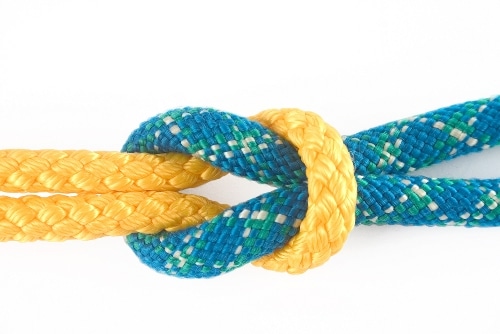
By
Last updated:
January 28, 2021
When you’re first starting to learn German, it’s not always clear exactly which words are going to be useful outside of hello and goodbye.
A big step toward getting confident listening to and speaking German is having some basic words at your disposal in everyday situations—whether it’s at the supermarket or the pub.
To make the going easier, I’ve compiled some truly useful German words and phrases to get you started.
Contents
- Little Helpers
- Q & A
- English Imports
- Take Your Conversation Skills to the Next Level
- Just for Fun…
- Practice Makes Perfect
Download:
This blog post is available as a convenient and portable PDF that you
can take anywhere.
Click here to get a copy. (Download)
Little Helpers
The words in this section are multi-purpose words that you’ll hear often, with definitions broad enough to apply in a variety of contexts—it’s handy to have these guys around.
Stimmt
I must confess to having a soft spot for this one as it’s the only word I ever learned from a German-speaking housemate years ago, long before getting serious about learning German. It means “agreed,” “right” or “true,” and is often used to affirm a comment someone else has made. It seems to work in a surprisingly wide range of contexts and can be modified very slightly to expand its meaning, e.g.:
Stimmt das?
Is that right?
Das stimmt nicht
That’s not right
Stimmt so!
Keep the change (handy in restaurants/cafes if you’re feeling generous).
Genau
Meaning “exactly,” this word works in a similar way to stimmt. It also serves as something of a filler or sentence connector when you’ve paused between statements, similar to the way you use “so” in English. Unlike stimmt, you’ll often find it used as an adjective too, e.g.:
Genau hier
Right here
Genau wie
Exactly like
Also
No, it doesn’t mean what you think, but bear with me! Translated as “well” or “so” and used in pretty much the same way as its English equivalents, this is a great one to have on hand. It stands alone or functions as a sentence opener.
Also! Fangen wir an?
Well, shall we get started? (Expression of enthusiasm)
Also…ich weiß es nicht.
Well…I don’t know. (Expression of uncertainty)
Combine it with Äh (pronounced “eh,” the German version of “um”). If you have to sound uncertain—and let’s face it, you’ll be doing a lot of this to start with—you might as well do so like a native!
Oder
Means “or,” but it’s also very often thrown onto the end of a statement, where it means “right?” or “isn’t it?”.
Machen
Although English has significantly more words in total than German, my guess is that German’s in front when it comes to verbs. Learning German verbs opens up a whole new world of possibility—and confusion. Many are incredibly similar to one another, yet an innocent little prefix can change the meaning dramatically.
Amidst such a minefield, machen, meaning both “to make” and “to do” is a good go-to for many situations.
One can not only ein Kuchen machen (make a cake) but also Party machen, Fotos machen and eine Diät machen (go on a diet). If you break something, you “make it broken,” es kaputt machen, and to finish up is Schluss machen, which literally translates to “to make an end.”
Watch out though: You don’t “make” friends in German. Instead, you’d use something akin to Freunde kennenlernen (to literally “get to know” friends). You also don’t “make” decisions, you’d phrase this as Entscheidungen treffen (to reach a decision). But on the upside, you can now chuckle knowingly when your German friends enthusiastically tell you in English that they’re “making the party.”
Q & A
When you’re out and about in the German-speaking world, there are certain phrases that you’ll hear time and again. In my case, early contributions to basic interactions with German speakers ranged from embarrassed silence to a mumbled danke or OK. Getting familiar with a few simple phrases, questions and responses will go a long way to boosting your comfort level in these situations.
Einen schönen Abend/Tag noch
This phrase is used for polite leave-taking, usually between strangers or acquaintances. It literally means “a lovely evening/day still” and is basically the equivalent of “have a nice day.” You’re likely to hear it at the supermarket checkout, along with schönes Wochenende, “have a nice weekend.”
Gleichfalls!
You can say this in reply to a polite leave-taking phrase such as the above. This means “likewise” or “same to you,” and it’s the appropriate catch-all response to all manner of well wishing.
Wie, bitte?
The German equivalent of “pardon?” which is the polite way of asking someone to repeat themselves, if you haven’t heard or understood.
Was geht (ab)?
This is how you’d informally say “what’s up?” or “what’s going on?” to a friend.
Was ist los?
What’s wrong?
Hast du was (etwas)?
Is something wrong?
Warum?
Why?
Echt?
Really?
Geil!
Cool!
Ach, so!
Aha!
It’s also a good idea to brush up on your Umgangsprache (slang) here.
English Imports
It’s reassuring to know that you’re going to regularly come across many German words that you recognize. One reason is that German and English share the same roots, stemming from the Germanic language family (you’ll find an interesting and rather beautiful illustration of this here).
In addition, just as English has absorbed many German loanwords, such as Zeitgeist and Schadenfreude, a growing number of German words are direct imports from English.
Like all languages, German continues to evolve with time. Some purists are less than pleased with the growing anglicization of Hochdeutsch, especially in cases where an English word has entered common usage to replace an existing German word. The product of this exchange is often derisively referred to as Denglisch (that is, German-English). Nevertheless, for the English-speaking German student, these words are small blessings.
They are also known, for obvious reasons, as “true friends” (as opposed to “false friends,” like Also above).
Take these verbs:
Skypen
downloaden
checken
chatten
bloggen
These have all been effectively adapted from English to the German grammatical structure. As you can see, many come from relatively recent developments in digital technology. But you’ll also find:
surfen (on the net as well as at the beach)
joggen
pushen
flirten
babysitten
smalltalken
And, increasingly:
Sorry (is it really surprising when Entschuldigung is such a mouthful?)
Finally, here’s a fairly exhaustive list of English loanwords in German.
Take Your Conversation Skills to the Next Level
Though it will take a while to learn how to use them properly, it’s useful to know from the outset about flavoring particles. You’ll find they pop up at seemingly random intervals everywhere—and they are, in fact, the key to speaking German like a native.
There are several, but we’re just going to dip our toes in the water with a few common examples: doch, mal, eigentlich and aber.
German speakers pepper their speech with these little guys all the time.
Each has a definition in its own right, but, much like the Senf on your Wurst, will also be used regularly in the middle of a sentence to alter its emphasis or “flavor.” Usually this means adding emphasis or toning something down. There’s no real equivalent in English, which may be one reason why native German speakers can come across as a little blunt when speaking English!
Doch
Means “yes” when at the start or end of a sentence, but only to refute a negative assumption, i.e. affirming an instance where doubt has been expressed.
Trinkst du kein Kaffee?
Don’t you drink coffee?
Doch!
Yes, I do!
See if you can pick up how it’s used in this short film. Doch can also be used to soften an otherwise rather blunt question or statement.
Komm doch mit!
Why don’t you come with us?
Mal
This little word pops up all over the place and is possibly the most over-used particle. Literally a shortening of einmal (once), it is, like doch, commonly used as a softener.
Guck mal!
Look!
Gehen wir mal ins Kino?
Why don’t we go to the movies?
Aber
But
Das ist aber gut!
That is (surprisingly, or contrary to what you just told me) good!
Eigentlich
Actually means “actually,” but can also mean “by the way” or “by chance.”
Hast du eigentlich die Zeit?
Do you have the time by any chance?
Relax: getting the hang of flavoring particles will take time. But even with only a vague grasp of how they work, at least now you’ll be prepared to listen out for them—and you’ll be a step closer to speaking like a native! If you think you’re game to venture further into the woods, what better way to do so than with a Grimm’s fairytale?
Just for Fun…
You’ll need to have a giggle from time to time. Lucky for you, German has plenty of amusing yet functional words to offer. Here’s a few that might make you smile.
Quatsch
Rubbish (e.g. Das ist Quatsch “that’s rubbish.” Also quatschen “to talk rubbish” or to talk about nothing much.)
Blöd
Stupid. It just feels good to say it!
Lust
Teehee. If someone asks you if you have Lust auf Schockolade, they’re not prompting you to expose your burning desire for the stuff, but rather whether you feel like eating it. Similarly, ich habe keine Lust darauf simply means “I don’t feel like it.”
Jein
Used to express a divided opinion. Yes and no in one—who but the Germans could be so efficient!
Practice Makes Perfect
Now that you’ve made it to the end of this list, it’s time to put these words to good use by practicing them.
Below are three apps that you can use to target new words through repetition, quizzes and more. Plus, by using engaging tools like those below, you’ll learn in a meaningful way. Even if you don’t have a lot of time each day to practice your vocabulary, these apps bring you bite-sized lessons straight to your phone!
- Memrise: As a gamified flashcard app, Memrise has both pre-made and user-made content to help you drill new words. You won’t get bored with here, as there are many different exercises available for each lesson. If you want to review new words quickly, you can use the “Speed Review” option.
- FluentU: This app takes video clips like movie trailers, TV show clips an music videos and creates interactive lessons from them so you can learn new vocabulary in context. The lessons include customized quizzes and flashcard decks, to which you can add words or terms so that you can focus your studies. The quizzes are personalized to your learning to improve your retention of new vocabulary words.
- Anki: This app comes with a simple but powerful interface to help you focus on one thing—flashcards. Here, you can create and customize flashcards however you want. Or, you can find decks premade by other users, which are reviewed and rated by the community.
If you want to dive in further, you’ll find more hilarious words here.
Enjoy!
Download:
This blog post is available as a convenient and portable PDF that you
can take anywhere.
Click here to get a copy. (Download)
Planning a trip to a German-speaking country? Or perhaps you are starting to learn German? You’ll need a list of the most basic German words and phrases.
From the simplest German words to the phrases you need to get by, here’s the list you need together with:
- its English translation, and
- a phonetic pronunciation guide
At the end of each section, you can also take the mini quizzes to make sure the words stick to your memory.
Ready? Let’s begin!
I. The Very Basics
Let’s start with the basic German words and phrases. With just these in your arsenal, you can already survive the simplest conversations!
LEARN GERMAN WORDS AND EXPRESSIONS NOW!
SIGN UP NOW TO GET THESE FOR FREE!
- 100 Days of German Words and Expressions E-book
- 300 Useful German Adjectives
| German word / phrase | English translation | Pronunciation |
|---|---|---|
| hallo | hello | hello |
| Ja | Yes | ya |
| Nein | No | niyn |
| Bitte | Please | bi-te. |
| Danke | Thank you | dân-ke |
| Bitte schön. | you’re welcome | bi-te shurn |
| Entschuldigen Sie. | Excuse me (getting attention) | ent-SHOOL-dee-gun zee |
| Entschuldigung! | Excuse me (sorry, asking pardon) | ênt-shool-dee-goong |
| Wie heißen Sie? | What’s your name? | vee hays-en zee? |
| Ich heiße…. | My name is… | iH hays-e…. |
| Freut mich | Pleased to meet you | froyt miH |
Mini Quiz 1
1. What does bitte schön mean?
Click to reveal the answer
2. Entschuldigen Sie and Entschuldigung both mean excuse me. But what makes them different from each other?
Click to reveal the answer
3. To say “pleased to meet you”, you say:
Click to reveal the answer
You can learn more German greetings in this article: A Quick Guide to German Greetings
II. Simple Questions
Now let’s talk about the simplest German questions. There’s another article here in this website that talks about this with more detail.
You can check it out here: Basic German Questions Every Traveler Should Know
For now let’s just run through the most simple ones that you can memorize quickly.
| Wo? | Where? | vo |
| Wann? | When? | van |
| Wie? | How? | vee |
| Warum? | Why? | va-room |
| Wer? | Who? | vair |
| Welches? | Which? | vel-shes |
| Wo ist…? | Where is…? | vo ist |
| Wie viel? | How much? | vee feel |
| Wie viele? | How many? | vee feel-e |
| Was ist das? | What’s that? | vass ist dass |
Mini Quiz 2
1. How do you ask “why?” in German?
Click to reveal the answer
2. What does “wo ist..?» mean
Click to reveal the answer
3. True or false: wie in German means who
Click to reveal the answer
Expressing likes or dislikes
In daily life, you’ll always be faced with different choices. Which one should you take? Which one do you like? Do you hate the one in front of you? Speak your mind with these simple German phrases!
| Ich hätte gern… | I’d like… | ixh hett-er gairn… |
| Ich möchte… | I want… | ixh merxht-er |
| Es gefällt mir. | I like it. | ess ge-felt meer |
| Es gefällt mir nicht. | I don’t like it. | ess ge-felt meer nixht |
| In Ordnung/Einverstanden. | OK/Agreed. | in ord-noong/iyn-fer-shtan-den |
| Das ist gut. | That’s good / That’s fine. | dass ist goot |
| Ich will/Wir wollen… | I want/We want… | ixh vill/veer voll-en |
| Ich bin/Wir sind… | I am/We are…. | ixh bin/veer zint |
| Ich habe/Wir haben… | I have/We have… | ixh har-ber/veer har-b |
Mini Quiz 3:
1. To say “I want…” in German, you say:
Click to reveal the answer
2. Das ist gut means
Click to reveal the answer
3. When you like something, you say:
Click to reveal the answer
Speaking Difficulties
When you’re in a place where you don’t speak the language that well, there’s bound to be some conversational hiccups. Solve any speaking difficulties you might have with the help of these useful phrases.
| Sprechen Sie Englisch? | Do you speak English? | shprêH-en zee êng-lish? |
| Ich kann nicht [so gut] Deutsch sprechen. | I can’t speak German (well). | eesh kahn nikht [zo goot] doytsh shpreH-en |
| Ich verstehe nicht. | I don’t understand. | ixh fair-shtay-er nixht |
| Können Sie das bitte wiederholen? | Can you repeat that please? | kern-en zee dâs bi-te vee-der-hoh-len? |
| Könnten Sie bitte langsamer sprechen? | Would you be able to speak slower please? | kern-en zee bi-te lâng-zâm-er shprêH-en? |
Needing Help
Need help finding your way around? Or perhaps it’s a different type of emergency? Here are some basic German phrases to help get you un-stuck!
| Würden Sie mir bitte helfen? | Would you help me please? | vuer-den zee meer bi-te hêl-fen? |
| Ich weiß nicht | I don’t know | ixh viyss nixht |
| Ich habe mich verirrt. | I’m lost. | eesh HAH-buh meesh fer-EERT |
| Kannst du/Können Sie mir das auf der Karte zeigen? | Can you show me on the map? | kahnst doo/KOON-en zee meer dahss ouf dayr KAHR-tuh TSIGH-gen? |
| Ich kenne mich hier nicht aus. | I don’t know my way around here. | iH kên-e miH heer niHt ous. |
Mini Quiz 4
1. Ich verstehe nicht means
Click to reveal the answer
2. How do you say “I’m lost” in German?
Click to reveal the answer
3. Würden Sie mir bitte helfen? Means
Click to reveal the answer
Conclusion
There you go with the most basic survival words and phrases in German. With these in your back pocket, you’re ready to take on a few conversations in German—with correct pronunciation, too!
To expand your vocabulary and boost your reading and listening skills, check out German short stories below!
A FUN AND EFFECTIVE WAY TO LEARN GERMAN
- 10 entertaining short stories about everyday themes
- Practice reading and listening with 90+ minutes of audio
- Learn 1,000+ new German vocabulary effortlessly!
200+ List of the Most Common German Words
By OptiLingo • 10 minute read
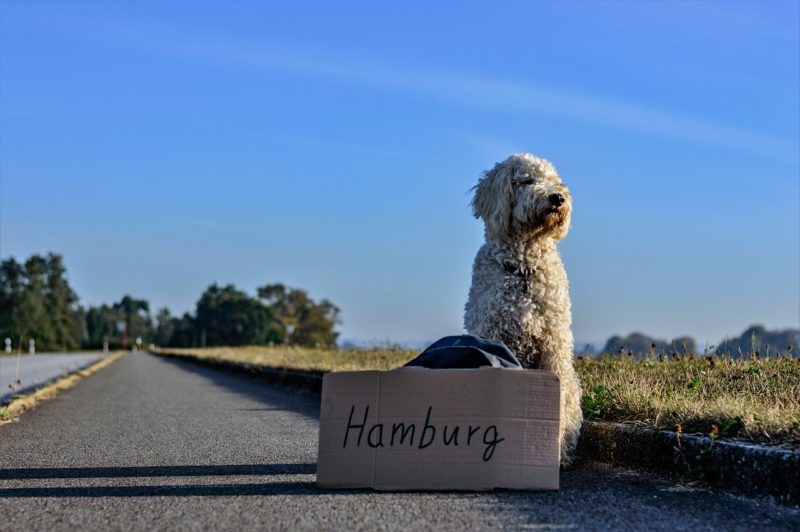
When you learn a new language, you need to know the core vocabulary. Without these words, you can’t form sentences, and can’t express your ideas. But, once you add these German words to your vocabulary, you’re guaranteed to reach fluency. And if you add the right words, you’ll achieve your goals even faster. Here’s why you should focus on the most common vocabulary, and then a list of 200+ of those words in German.
Fluency Isn’t About How Many Words You Know
A lot of students try to cram in as many words as they can. They brag that they learned hundreds of new German words, and they even know the most obscure words in German. Good for them. But, this doesn’t mean they’re fluent. If they try to whip up their newfound knowledge in a real conversation, they’ll fall flat.
That’s because fluency isn’t about how many German words you know. It’s about knowing the right German words. Learning only the most common and most used German words doesn’t just make you a good conversation partner. You’ll also reach fluency much faster.

Psst! Did you know we have a language learning app?
You’re only one click away!
Use the 80/20 Principle to Learn Common German Words
If you don’t believe me that you should only concentrate on the most common words, hopefully, you’ll believe science. 80% of everyday German conversations comes from 20% of the total vocabulary. It’s called the Pareto Principle, or the 80/20 rule. And you can use this to reach fluency faster.
If you only learn that 20% of the German language, you can take part in 80% of the conversations. So, with only a little effort, you can have a lot of success already. But, which exact words are part of that 20%?
Well, the following list includes the most 200 common German words. That’s a great start. But, if you’re hungry for more, you can easily access the full list with the OptiLingo app. This reliable language learning method gives you pronunciation practice and a list of the most useful German vocabulary at the same time.
200+ Common German Words
You’ll definitely need these 222 German words to speak German fluently. We divided them according to their grammatical categories, so it’s even easier for you to focus on one group at a time. Of course, there are way more words in the German language. But, once you know these, speaking German will only be a matter of grammar.
List of Common German Nouns
German Nouns |
Translation |
|
das Beispiel, -e |
example |
|
das Ende, -n |
end |
|
das Geld |
money |
|
das Haus, -¨er |
house |
|
das Jahr, -e |
year |
|
das Kind, -er |
child |
|
das Land, -¨er |
country, land |
|
das Leben |
life |
|
das Mädchen |
girl |
|
das Mal, -e |
time (number of times) |
|
das Problem, -e |
problem |
|
das Prozent, -e |
percent |
|
das Recht, -e |
right, law |
|
der Abend |
evening, eve, night |
|
der Fall, -¨e |
fall, case |
|
der Freund |
friend |
|
der Herr, -en |
man, gentleman, Mr. |
|
der Junge, -n |
boy |
|
der Mann, -¨er |
man |
|
der Mensch, -en |
human being, man |
|
der Tag, -e |
day |
|
der/das Teil, -e |
part |
|
die Angst |
fear, anxiety |
|
die Arbeit, -en |
work, job |
|
die Frage, -n |
question |
|
die Frau, -en |
woman, wife, Mrs. |
|
die Hand, -¨e |
hand |
|
die Leute |
people |
|
die Million (Mio.), -en |
million |
|
die Stadt, -¨e |
city |
|
die Welt, -en |
world |
|
die Zeit |
time |
List of the Most Common German Verbs
German Verbs |
Translation |
|
anrufen |
to call, phone |
|
arbeiten |
to work |
|
bleiben |
to stay, remain |
|
brauchen |
to need |
|
bringen |
to bring |
|
denken |
to think |
|
dürfen |
may, to be allowed |
|
finden |
to find |
|
geben |
to give; to put; to deal; there is/are |
|
gehen |
to go, walk; to leave; to work; to be in progress, last; to be going; to approach |
|
glauben |
to believe |
|
haben |
to have |
|
heißen |
to be called |
|
kommen |
to come |
|
können |
can, to be able to |
|
lassen |
to let, allow, have done |
|
leben |
to live |
|
liegen |
to lie, be lying |
|
machen |
to make, do, prepare; to produce; to go; to put |
|
müssen |
must, to have to |
|
nehmen |
to take |
|
sagen |
to say, tell |
|
sehen |
to see, look; to take care of; to view, watch, observe; to notice |
|
sein |
to be, to have, to exist, there is / it is |
|
sollen |
should, ought to |
|
stehen |
to stand |
|
tun |
to do |
|
wissen |
to know |
|
wollen |
to want |
|
werden |
to get, to become; will, to be going to; to be done (forms the passive voice) |
List of the Most Common German Adjectives
German Adejectives |
Translation |
|
alt |
old |
|
anz |
whole, all the |
|
deutsch |
German |
|
eigen |
own |
|
erste, -r, -s |
first |
|
genau |
exact |
|
gleich |
equal, same |
|
groß |
big, large, great |
|
gut |
good |
|
hoch |
high, tall |
|
jung |
young |
|
klein |
small, little |
|
kurz |
short |
|
lang |
long |
|
letzte, -r, -s |
last |
|
möglich |
possible |
|
neu |
new |
|
richtig |
right, correct |
|
spät |
late |
|
stark |
strong |
|
verschieden |
different, diverse |
|
weitere, -r, -s |
additional |
|
wichtig |
important |
|
wirklich |
real, true, natural |
|
besser |
better, preferably |
|
einfach |
easy, simple, plain; single, one-way; simply, just |
|
schön |
beautiful, lovely; good, great; nice; fine (adjective); well, beautifully; nicely; really (adverb) |
|
viel |
much, a lot |
|
weiß |
white (adjective) |
|
genug |
enough |
|
los |
loose, not attached, rid of |
List of Common German Adverbs
German Adverbs |
Translation |
also |
so, therefore |
|
auch |
also, too, as well |
|
da |
there |
|
dabei |
there, here, then, so (adverb); since, as, given that (conjunction) |
|
dafür |
for this |
|
dann |
then, after that |
|
davon |
from that |
|
doch |
but, still |
|
dort |
there |
|
eben |
just now |
|
eigentlich |
actually |
|
erst |
first, only, not until |
|
gar |
at all |
|
heute |
today, nowadays |
|
hier |
here |
|
immer |
always |
|
jetzt |
now; yet |
|
mehr |
more |
|
natürlich |
naturally, of course |
|
nicht |
not |
|
nie |
never |
|
noch |
still, yet |
|
nun, nu |
now |
|
nur |
only, merely, just; |
|
oben |
above, up there |
|
schon |
already |
|
sehr |
very |
|
so |
so, thus, this way, such |
|
vielleicht |
perhaps, maybe |
|
warum |
why |
|
weit |
widely, far |
|
wieder |
again |
|
zurück |
back, backwards |
|
ganz |
all, all the, every, everything, everybody, everyone |
|
gerade |
just |
|
aber |
again (adverb); but, though (conjunction) |
|
damit |
with it, thereby; so that, in order that |
|
wo |
where, somewhere; when |
|
wie |
how (adverb); like, as (conjunction) |
|
ja |
yes; really, definitely; of course (adverb); a yes (capitalized as a noun – Ja) |
|
nein |
no; a no |
Common German Conjunctions to Make Sentences
German Conjunctions |
Translation |
|
als |
than, when, as, while, as if |
|
bevor |
before |
|
beziehungsweise |
or, respectively |
|
dass |
that |
|
denn |
because |
|
entweder…oder |
either…or |
|
falls |
in case, if |
|
indem |
while, by |
|
nachdem |
after |
|
ob |
whether |
|
obwohl |
although |
|
oder |
or |
|
so dass |
so that |
|
sobald |
as soon as |
|
solange |
as long as |
|
sondern |
but (rather) |
|
sowie |
as well as |
|
sowohl … und |
both |
|
und |
and |
|
weder noch |
neither … nor |
|
weil |
because |
|
wenn |
if, when, whenever |
|
zumal |
particularly, especially |
List of the Most Common German Pronouns
German Pronouns |
Translation |
|
diese |
this, these |
|
ein |
a, an |
|
andere |
other, different, next |
|
kein |
no, not a, not an; |
|
man |
one, they, you |
|
nichts |
nothing |
|
all |
all, all the, every, everything, everybody, everyone |
|
etwas |
some, something, any (pronoun); somewhat, slightly, a little, a bit (adverb); something (capitalized as a noun – Etwas) |
|
ach |
oh! |
|
bitte |
please, you’re welcome, excuse me, please do, go ahead; request, plea (capitalized as a noun – die Bitte); to ask (inflection of the verb “bitten”) |
|
danke |
thank you!, thanks!; inflection of the verb “danken” |
|
was |
what (interrogative); which (relative) |
|
wer |
who; the person who; somebody, someone |
German Personal and Reflexive Pronouns
German Pronouns |
Translation |
|
du |
you (informal, singular) |
|
er |
he, it |
|
es |
it |
|
euch |
you, yourselves (plural ) |
|
ihm |
him, to him |
|
ihn |
him, it |
|
ihnen |
them, to them |
|
mir |
me, to me |
|
Sie |
you (polite, singular or plural) |
|
sie |
she, it; they, you |
|
wir |
we |
|
ihr |
you, you all (plural, informal); her, to her ; her, its, their |
|
dich |
you; yourself |
|
dir |
you, to you; yourself, to yourself |
|
uns |
us; ourselves |
|
mich |
me, myself |
|
ich |
I (not capitalized); ego (capitalized – Ich) |
|
deine |
your |
|
ihre |
hers, its, theirs |
|
Ihre |
yours (singular and plural) |
|
mein |
my |
|
am |
on, at, on the, at the |
|
an |
to, on, at, by, about, against |
List of Common German Prepositions
German Prepositions |
Translation |
|
am |
on, at, on the, at the |
|
an |
to, on, at, by, about, against |
|
auf |
on, onto, at |
|
aus |
out of, from |
|
bei |
by, near, with, at |
|
durch |
through, by means of |
|
für |
for |
|
gegen |
against |
|
gegenüber |
across from |
|
hinter |
behind, in back of |
|
im |
in the |
|
in |
in |
|
in |
in, within, at, pertaining to |
|
ins |
to the, into the |
|
mit |
with |
|
nach |
after, to, toward |
|
neben |
beside, next to |
|
ohne |
without |
|
seit |
since, for a period of time |
|
über |
above, over, about |
|
um |
around, at |
|
unter |
under |
|
von |
from, of |
|
vor |
in front of, before, ago |
|
während |
during |
|
wegen |
because of |
|
zu |
to, at |
|
zwischen |
between |
|
ab |
from, as of (preposition); off, away (adverb) |
|
bis |
to |
|
sich |
oneself, itself, himself, herself, themselves |
How to Learn This List of Common German Words
Now you’ve got 222 German words. That’s great, but what’s next? Well, you need to learn them. Having them here, or even on a piece of paper won’t make this knowledge yours. So, how can you learn these German words fast and effectively? Here are a few tricks you can use to commit them to your long term memory effortlessly:
- Don’t cram! Let’s start off with what not to do. Never, under any circumstances, try to cram German vocabulary. Forcing yourself to remember a lot in a short time only leads to two things: you’ll hate your lessons and you won’t actually commit them to your long term memory. Try one of the following techniques instead:
- Try chunking: Chunking is a great memory aid. Try to divide this German vocabulary list into smaller and more manageable groups. These can be by categories or topics too. Then, you learn the groups one by one. Smaller and more achievable tasks get you to success steadily.
- Use spaced repetition: Wouldn’t it be awesome if you could hack your brain to store all this information? Well, you actually can. With spaced repetition, you can remember anything you want. It’s a simple trick that not many know about. You just periodically review this list of German words. Every time you come back to read these, you’ll reinforce your German knowledge. Soon, you can recall all 222 of these German words effortlessly.
- Write it all down: Handwriting is linked to tactile learning. If you write these words down by hand you’ll remember them better.
- Say them out loud: The only way to reach fluency is by speaking a lot. Practice your German pronunciation. The more you say these German words, the more it sticks to your memory. And you’ll also get more comfortable with the language.
Learn Even More Common German Words
222 common German words is a lot. But, there’s a lot more to a full German vocabulary than that. If you want to learn all the most useful German words and phrases, you need to use OptiLingo.
OptiLingo is the app that gets you to fluency. It gives you all the best German vocabulary, for sure. But, it also makes you speak the language. It builds your confidence and shows you exactly how the locals speak. Achieve German learning success when you download OptiLingo!
Hallo!
Have you been looking to improve your conversational skills and effectively tackle a lot of new vocabulary? Check out our post on the 1000 Most Common German Words below.
When learning a new language the amount of vocabulary can be daunting. Have you heard people say things like: “We only use around 700 words when we talk?” This is true to some degree. The number of words to learn to speak a language really depends on your purpose. Remember that 300 to 600 words may be enough to travel, but at least 1000 words are necessary for a conversation. The most important thing is not knowing how many words you need to speak a language, but which words to know. Complete fluency is in the 10,000 word range. According to the economist: “Most adult native test-takers range from 20,000–35,000 words. Average native test-takers of age 8 already know 10,000 words. Average native test-takers of age 4 already know 5,000 words. Adult native test-takers learn almost 1 new word a day until middle age”
10,000 words. Wow. That does seem daunting when you are first starting out. But like anything new, you just have to start small and keep adding to it.
That’s why we wrote this blog article: which features the 1000 most frequently used German words.
Why these 1000 words?
Let’s imagine that you just got a job as a bartender. Would you try to learn every cocktail known to man, or would you focus on the cocktails that are most popular in your area? We developed this list of words based on the idea of the 80/20 principle (the cornerstone of results-based living). This strategy developed by David Kock says “The 80/20 Principle asserts that a minority of causes, inputs or efforts usually lead to a majority of the results, outputs or rewards” So instead of learning 10,000 words in no particular order, learn the most common 100 words, then the most common 500 words, and then the most common 1000 words. If you want to check out this classic business book, you can order it here.
Other great ways to improve your vocabulary:
- Watch Netflix in Original language with original language captions
- Check out a great book like this: 2500 most frequently used German words
- Do some quick daily exercises on DuoLingo or any other free language learning app
- Take some classes with us at Strømmen and speak to a real human in person or online
| Number | German | in English |
| 1 | wie | as |
| 2 | ich | I |
| 3 | seine | his |
| 4 | dass | that |
| 5 | er | he |
| 6 | war | was |
| 7 | für | for |
| 8 | auf | on |
| 9 | sind | are |
| 10 | mit | with |
| 11 | sie | they |
| 12 | sein | be |
| 13 | bei | at |
| 14 | ein | one |
| 15 | haben | have |
| 16 | dies | this |
| 17 | aus | from |
| 18 | durch | by |
| 19 | heiß | hot |
| 20 | Wort | word |
| 21 | aber | but |
| 22 | was | what |
| 23 | einige | some |
| 24 | ist | is |
| 25 | es | it |
| 26 | Sie | you |
| 27 | oder | or |
| 28 | hatte | had |
| 29 | die | the |
| 30 | von | of |
| 31 | zu | to |
| 32 | und | and |
| 33 | ein | a |
| 34 | bei | in |
| 35 | wir | we |
| 36 | können | can |
| 37 | aus | out |
| 38 | andere | other |
| 39 | waren | were |
| 40 | die | which |
| 41 | tun | do |
| 42 | ihre | their |
| 43 | Zeit | time |
| 44 | wenn | if |
| 45 | werden | will |
| 46 | wie | how |
| 47 | sagte | said |
| 48 | ein | an |
| 49 | jeder | each |
| 50 | sagen | tell |
| 51 | tut | does |
| 52 | Satz | set |
| 53 | drei | three |
| 54 | wollen | want |
| 55 | Luft | air |
| 56 | gut | well |
| 57 | auch | also |
| 58 | spielen | play |
| 59 | klein | small |
| 60 | Ende | end |
| 61 | setzen | put |
| 62 | Zuhause | home |
| 63 | lesen | read |
| 64 | seits | hand |
| 65 | Hafen | port |
| 66 | groß | large |
| 67 | buchstabieren | spell |
| 68 | hinzufügen | add |
| 69 | auch | even |
| 70 | Lande | land |
| 71 | hier | here |
| 72 | muss | must |
| 73 | groß | big |
| 74 | hoch | high |
| 75 | so | such |
| 76 | folgen | follow |
| 77 | Akt | act |
| 78 | warum | why |
| 79 | fragen | ask |
| 80 | Männer | men |
| 81 | Veränderung | change |
| 82 | ging | went |
| 83 | Licht | light |
| 84 | Art | kind |
| 85 | aus | off |
| 86 | müssen | need |
| 87 | Haus | house |
| 88 | Bild | picture |
| 89 | versuchen | try |
| 90 | uns | us |
| 91 | wieder | again |
| 92 | Tier | animal |
| 93 | Punkt | point |
| 94 | Mutter | mother |
| 95 | Welt | world |
| 96 | in der Nähe von | near |
| 97 | bauen | build |
| 98 | selbst | self |
| 99 | Erde | earth |
| 100 | Vater | father |
| 101 | jeder | any |
| 102 | neu | new |
| 103 | Arbeit | work |
| 104 | Teil | part |
| 105 | nehmen | take |
| 106 | erhalten | get |
| 107 | Ort | place |
| 108 | gemacht | made |
| 109 | leben | live |
| 110 | wo | where |
| 111 | nach | after |
| 112 | zurück | back |
| 113 | wenig | little |
| 114 | nur | only |
| 115 | Runde | round |
| 116 | Mann | man |
| 117 | Jahr | year |
| 118 | kam | came |
| 119 | zeigen | show |
| 120 | jeder | every |
| 121 | gut | good |
| 122 | mir | me |
| 123 | geben | give |
| 124 | unsere | our |
| 125 | unter | under |
| 126 | Name | name |
| 127 | sehr | very |
| 128 | durch | through |
| 129 | nur | just |
| 130 | Formular | form |
| 131 | Satz | sentence |
| 132 | groß | great |
| 133 | denken | think |
| 134 | sagen | say |
| 135 | Hilfe | help |
| 136 | niedrig | low |
| 137 | Linie | line |
| 138 | abweichen | differ |
| 139 | wiederum | turn |
| 140 | Ursache | cause |
| 141 | viel | much |
| 142 | bedeuten | mean |
| 143 | vor | before |
| 144 | Umzug | move |
| 145 | Recht | right |
| 146 | Junge | boy |
| 147 | alt | old |
| 148 | zu | too |
| 149 | gleich | same |
| 150 | sie | she |
| 151 | alle | all |
| 152 | da | there |
| 153 | wenn | when |
| 154 | nach oben | up |
| 155 | Verwendung | use |
| 156 | Ihre | your |
| 157 | Weg | way |
| 158 | über | about |
| 159 | viele | many |
| 160 | dann | then |
| 161 | sie | them |
| 162 | schreiben | write |
| 163 | würde | would |
| 164 | wie | like |
| 165 | so | so |
| 166 | diese | these |
| 167 | sie | her |
| 168 | lange | long |
| 169 | machen | make |
| 170 | Sache | thing |
| 171 | sehen | see |
| 172 | ihm | him |
| 173 | zwei | two |
| 174 | hat | has |
| 175 | suchen | look |
| 176 | mehr | more |
| 177 | Tag | day |
| 178 | könnte | could |
| 179 | gehen | go |
| 180 | kommen | come |
| 181 | tat | did |
| 182 | Anzahl | number |
| 183 | klingen | sound |
| 184 | nicht | no |
| 185 | am meisten | most |
| 186 | Menschen | people |
| 187 | meine | my |
| 188 | über | over |
| 189 | wissen | know |
| 190 | Wasser | water |
| 191 | als | than |
| 192 | Anruf | call |
| 193 | erste | first |
| 194 | die | who |
| 195 | können | may |
| 196 | nach unten | down |
| 197 | Seite | side |
| 198 | gewesen | been |
| 199 | jetzt | now |
| 200 | finden | find |
| 201 | Kopf | head |
| 202 | stehen | stand |
| 203 | besitzen | own |
| 204 | Seite | page |
| 205 | sollte | should |
| 206 | Land | country |
| 207 | gefunden | found |
| 208 | Antwort | answer |
| 209 | Schule | school |
| 210 | wachsen | grow |
| 211 | Studie | study |
| 212 | noch | still |
| 213 | lernen | learn |
| 214 | Anlage | plant |
| 215 | Abdeckung | cover |
| 216 | Lebensmittel | food |
| 217 | Sonne | sun |
| 218 | vier | four |
| 219 | zwischen | between |
| 220 | Zustand | state |
| 221 | halten | keep |
| 222 | Auge | eye |
| 223 | nie | never |
| 224 | letzte | last |
| 225 | lassen | let |
| 226 | Gedanken | thought |
| 227 | Stadt | city |
| 228 | Baum | tree |
| 229 | überqueren | cross |
| 230 | Bauernhof | farm |
| 231 | schwer | hard |
| 232 | Beginn | start |
| 233 | Macht | might |
| 234 | Geschichte | story |
| 235 | Säge | saw |
| 236 | weit | far |
| 237 | Meer | sea |
| 238 | ziehen | draw |
| 239 | links | left |
| 240 | spät | late |
| 241 | laufen | run |
| 242 | unterlassen Sie | don’t |
| 243 | während | while |
| 244 | Presse | press |
| 245 | Schließen | close |
| 246 | Nacht | night |
| 247 | realen | real |
| 248 | Leben | life |
| 249 | wenige | few |
| 250 | Norden | north |
| 251 | Buch | book |
| 252 | tragen | carry |
| 253 | nahm | took |
| 254 | Wissenschaft | science |
| 255 | essen | eat |
| 256 | Zimmer | room |
| 257 | Freund | friend |
| 258 | begann | began |
| 259 | Idee | idea |
| 260 | Fisch | fish |
| 261 | berg | mountain |
| 262 | Stopp | stop |
| 263 | einmal | once |
| 264 | Basis | base |
| 265 | hören | hear |
| 266 | Pferd | horse |
| 267 | Schnitt | cut |
| 268 | sicher | sure |
| 269 | beobachten | watch |
| 270 | Farbe | color |
| 271 | Gesicht | face |
| 272 | Holz | wood |
| 273 | Haupt- | main |
| 274 | geöffnet | open |
| 275 | scheinen | seem |
| 276 | zusammen | together |
| 277 | nächste | next |
| 278 | weiß | white |
| 279 | Kinder | children |
| 280 | Start | begin |
| 281 | bekam | got |
| 282 | gehen | walk |
| 283 | Beispiel | example |
| 284 | erleichtern | ease |
| 285 | Papier | paper |
| 286 | Gruppe | group |
| 287 | immer | always |
| 288 | Musik | music |
| 289 | diejenigen | those |
| 290 | beide | both |
| 291 | Marke | mark |
| 292 | oft | often |
| 293 | Schreiben | letter |
| 294 | bis | until |
| 295 | Meile | mile |
| 296 | Fluss | river |
| 297 | Auto | car |
| 298 | Füße | feet |
| 299 | Pflege | care |
| 300 | zweite | second |
| 301 | genug | enough |
| 302 | Ebene | plain |
| 303 | Mädchen | girl |
| 304 | üblich | usual |
| 305 | jung | young |
| 306 | bereit | ready |
| 307 | oben | above |
| 308 | je | ever |
| 309 | rot | red |
| 310 | Liste | list |
| 311 | obwohl | though |
| 312 | fühlen | feel |
| 313 | Vortrag | talk |
| 314 | Vogel | bird |
| 315 | bald | soon |
| 316 | Körper | body |
| 317 | Hund | dog |
| 318 | Familie | family |
| 319 | direkt | direct |
| 320 | Pose | pose |
| 321 | verlassen | leave |
| 322 | Lied | song |
| 323 | messen | measure |
| 324 | Tür | door |
| 325 | Produkt | product |
| 326 | schwarz | black |
| 327 | kurz | short |
| 328 | Zahl | numeral |
| 329 | Klasse | class |
| 330 | Wind | wind |
| 331 | Frage | question |
| 332 | passieren | happen |
| 333 | vollständig | complete |
| 334 | Schiff | ship |
| 335 | Bereich | area |
| 336 | Hälfte | half |
| 337 | Stein | rock |
| 338 | bestellen | order |
| 339 | Feuer | fire |
| 340 | Süden | south |
| 341 | Problem | problem |
| 342 | Stück | piece |
| 343 | sagte | told |
| 344 | wusste | knew |
| 345 | passieren | pass |
| 346 | seit | since |
| 347 | obere | top |
| 348 | ganze | whole |
| 349 | König | king |
| 350 | Straße | street |
| 351 | Zoll | inch |
| 352 | multiplizieren | multiply |
| 353 | nichts | nothing |
| 354 | Kurs | course |
| 355 | bleiben | stay |
| 356 | Rad | wheel |
| 357 | voll | full |
| 358 | Kraft | force |
| 359 | blau | blue |
| 360 | Objekt | object |
| 361 | entscheiden | decide |
| 362 | Oberfläche | surface |
| 363 | tief | deep |
| 364 | Mond | moon |
| 365 | Insel | island |
| 366 | Fuß | foot |
| 367 | System | system |
| 368 | beschäftigt | busy |
| 369 | Prüfung | test |
| 370 | Rekord | record |
| 371 | Boot | boat |
| 372 | gemeinsam | common |
| 373 | goldenen | gold |
| 374 | möglich | possible |
| 375 | Flugzeug | plane |
| 376 | statt | stead |
| 377 | trocken | dry |
| 378 | Wunder | wonder |
| 379 | Lachen | laugh |
| 380 | tausend | thousand |
| 381 | vor | ago |
| 382 | lief | ran |
| 383 | überprüfen | check |
| 384 | Spiel | game |
| 385 | Form | shape |
| 386 | gleichsetzen | equate |
| 387 | heiß | hot |
| 388 | Fehl | miss |
| 389 | gebracht | brought |
| 390 | Wärme | heat |
| 391 | Schnee | snow |
| 392 | Reifen | tire |
| 393 | bringen | bring |
| 394 | ja | yes |
| 395 | entfernt | distant |
| 396 | füllen | fill |
| 397 | Osten | east |
| 398 | malen | paint |
| 399 | Sprache | language |
| 400 | unter | among |
| 401 | Einheit | unit |
| 402 | Macht | power |
| 403 | Stadt | town |
| 404 | fein | fine |
| 405 | sicher | certain |
| 406 | fliegen | fly |
| 407 | fallen | fall |
| 408 | führen | lead |
| 409 | Schrei | cry |
| 410 | dunkel | dark |
| 411 | Maschine | machine |
| 412 | note | note |
| 413 | warten | wait |
| 414 | Plan | plan |
| 415 | Abbildung | figure |
| 416 | Stern | star |
| 417 | Kasten | box |
| 418 | Nomen | noun |
| 419 | Feld | field |
| 420 | Rest | rest |
| 421 | richtig | correct |
| 422 | fähig | able |
| 423 | Pfund | pound |
| 424 | getan | done |
| 425 | Schönheit | beauty |
| 426 | Antriebs | drive |
| 427 | stand | stood |
| 428 | enthalten | contain |
| 429 | Front | front |
| 430 | lehren | teach |
| 431 | Woche | week |
| 432 | Finale | final |
| 433 | gab | gave |
| 434 | grün | green |
| 435 | oh | oh |
| 436 | schnell | quick |
| 437 | entwickeln | develop |
| 438 | Ozean | ocean |
| 439 | warme | warm |
| 440 | kostenlos | free |
| 441 | Minute | minute |
| 442 | stark | strong |
| 443 | besondere | special |
| 444 | Geist | mind |
| 445 | hinter | behind |
| 446 | klar | clear |
| 447 | Schwanz | tail |
| 448 | produzieren | produce |
| 449 | Tatsache | fact |
| 450 | Raum | space |
| 451 | gehört | heard |
| 452 | beste | best |
| 453 | Stunde | hour |
| 454 | besser | better |
| 455 | wahr | true |
| 456 | während | during |
| 457 | hundert | hundred |
| 458 | fünf | five |
| 459 | merken | remember |
| 460 | Schritt | step |
| 461 | früh | early |
| 462 | halten | hold |
| 463 | Westen | west |
| 464 | Boden | ground |
| 465 | Interesse | interest |
| 466 | erreichen | reach |
| 467 | schnell | fast |
| 468 | Verbum | verb |
| 469 | singen | sing |
| 470 | hören | listen |
| 471 | sechs | six |
| 472 | Tabelle | table |
| 473 | Reise | travel |
| 474 | weniger | less |
| 475 | Morgen | morning |
| 476 | zehn | ten |
| 477 | einfach | simple |
| 478 | mehrere | several |
| 479 | Vokal | vowel |
| 480 | auf | toward |
| 481 | Krieg | war |
| 482 | legen | lay |
| 483 | gegen | against |
| 484 | Muster | pattern |
| 485 | schleppend | slow |
| 486 | Zentrum | center |
| 487 | Liebe | love |
| 488 | Person | person |
| 489 | Geld | money |
| 490 | dienen | serve |
| 491 | erscheinen | appear |
| 492 | Straße | road |
| 493 | Karte | map |
| 494 | regen | rain |
| 495 | Regel | rule |
| 496 | regieren | govern |
| 497 | ziehen | pull |
| 498 | Kälte | cold |
| 499 | Hinweis | notice |
| 500 | Stimme | voice |
| 501 | Energie | energy |
| 502 | Jagd | hunt |
| 503 | wahrscheinlich | probable |
| 504 | Bett | bed |
| 505 | Bruder | brother |
| 506 | Ei | egg |
| 507 | Fahrt | ride |
| 508 | Zelle | cell |
| 509 | glauben | believe |
| 510 | vielleicht | perhaps |
| 511 | pflücken | pick |
| 512 | plötzlich | sudden |
| 513 | zählen | count |
| 514 | Platz | square |
| 515 | Grund | reason |
| 516 | Dauer | length |
| 517 | vertreten | represent |
| 518 | Kunst | art |
| 519 | Thema | subject |
| 520 | Region | region |
| 521 | Größe | size |
| 522 | variieren | vary |
| 523 | regeln | settle |
| 524 | sprechen | speak |
| 525 | Gewicht | weight |
| 526 | allgemein | general |
| 527 | Eis | ice |
| 528 | Materie | matter |
| 529 | Kreis | circle |
| 530 | Paar | pair |
| 531 | umfassen | include |
| 532 | Kluft | divide |
| 533 | Silbe | syllable |
| 534 | Filz | felt |
| 535 | groß | grand |
| 536 | Kugel | ball |
| 537 | noch | yet |
| 538 | Welle | wave |
| 539 | fallen | drop |
| 540 | Herz | heart |
| 541 | Uhr | am |
| 542 | vorhanden | present |
| 543 | schwer | heavy |
| 544 | Tanz | dance |
| 545 | Motor | engine |
| 546 | Position | position |
| 547 | Arm | arm |
| 548 | breit | wide |
| 549 | Segel | sail |
| 550 | Material | material |
| 551 | Fraktion | fraction |
| 552 | Wald | forest |
| 553 | sitzen | sit |
| 554 | Rennen | race |
| 555 | Fenster | window |
| 556 | Speicher | store |
| 557 | Sommer | summer |
| 558 | Zug | train |
| 559 | Schlaf | sleep |
| 560 | beweisen | prove |
| 561 | einsam | lone |
| 562 | Bein | leg |
| 563 | Übung | exercise |
| 564 | Wand | wall |
| 565 | Fang | catch |
| 566 | Berg | mount |
| 567 | wünschen | wish |
| 568 | Himmel | sky |
| 569 | Board | board |
| 570 | Freude | joy |
| 571 | Winter | winter |
| 572 | sa | sat |
| 573 | geschrieben | written |
| 574 | wilden | wild |
| 575 | Instrument | instrument |
| 576 | gehalten | kept |
| 577 | Glas | glass |
| 578 | Gras | grass |
| 579 | Kuh | cow |
| 580 | Arbeit | job |
| 581 | Rand | edge |
| 582 | Zeichen | sign |
| 583 | Besuch | visit |
| 584 | Vergangenheit | past |
| 585 | weich | soft |
| 586 | Spaß | fun |
| 587 | hell | bright |
| 588 | Gases | gas |
| 589 | Wetter | weather |
| 590 | Monat | month |
| 591 | Million | million |
| 592 | tragen | bear |
| 593 | Finish | finish |
| 594 | glücklich | happy |
| 595 | hoffen | hope |
| 596 | blume | flower |
| 597 | kleiden | clothe |
| 598 | seltsam | strange |
| 599 | Vorbei | gone |
| 600 | Handel | trade |
| 601 | Melodie | melody |
| 602 | Reise | trip |
| 603 | Büro | office |
| 604 | empfangen | receive |
| 605 | Reihe | row |
| 606 | Mund | mouth |
| 607 | genau | exact |
| 608 | Zeichen | symbol |
| 609 | sterben | die |
| 610 | am wenigsten | least |
| 611 | Ärger | trouble |
| 612 | Schrei | shout |
| 613 | außer | except |
| 614 | schrieb | wrote |
| 615 | Samen | seed |
| 616 | Ton | tone |
| 617 | beitreten | join |
| 618 | vorschlagen | suggest |
| 619 | sauber | clean |
| 620 | Pause | break |
| 621 | Dame | lady |
| 622 | Hof | yard |
| 623 | steigen | rise |
| 624 | schlecht | bad |
| 625 | Schlag | blow |
| 626 | Öl | oil |
| 627 | Blut | blood |
| 628 | berühren | touch |
| 629 | wuchs | grew |
| 630 | Cent | cent |
| 631 | mischen | mix |
| 632 | Mannschaft | team |
| 633 | Draht | wire |
| 634 | Kosten | cost |
| 635 | verloren | lost |
| 636 | braun | brown |
| 637 | tragen | wear |
| 638 | Garten | garden |
| 639 | gleich | equal |
| 640 | gesendet | sent |
| 641 | wählen | choose |
| 642 | fiel | fell |
| 643 | passen | fit |
| 644 | fließen | flow |
| 645 | Messe | fair |
| 646 | Bank | bank |
| 647 | sammeln | collect |
| 648 | sparen | save |
| 649 | Kontrolle | control |
| 650 | dezimal | decimal |
| 651 | Ohr | ear |
| 652 | sonst | else |
| 653 | ganz | quite |
| 654 | pleite | broke |
| 655 | Fall | case |
| 656 | Mitte | middle |
| 657 | töten | kill |
| 658 | Sohn | son |
| 659 | See | lake |
| 660 | Moment | moment |
| 661 | Maßstab | scale |
| 662 | laut | loud |
| 663 | Frühling | spring |
| 664 | beobachten | observe |
| 665 | Kind | child |
| 666 | gerade | straight |
| 667 | Konsonant | consonant |
| 668 | Nation | nation |
| 669 | Wörterbuch | dictionary |
| 670 | milch | milk |
| 671 | Geschwindigkeit | speed |
| 672 | Verfahren | method |
| 673 | Orgel | organ |
| 674 | zahlen | pay |
| 675 | Alter | age |
| 676 | Abschnitt | section |
| 677 | Kleid | dress |
| 678 | Wolke | cloud |
| 679 | Überraschung | surprise |
| 680 | ruhig | quiet |
| 681 | Stein | stone |
| 682 | winzig | tiny |
| 683 | Aufstieg | climb |
| 684 | kühlen | cool |
| 685 | Entwurf | design |
| 686 | arm | poor |
| 687 | Menge | lot |
| 688 | Versuch | experiment |
| 689 | Boden | bottom |
| 690 | Schlüssel | key |
| 691 | Eisen | iron |
| 692 | Einzel | single |
| 693 | Stick | stick |
| 694 | Wohnung | flat |
| 695 | zwanzig | twenty |
| 696 | Haut | skin |
| 697 | Lächeln | smile |
| 698 | Falte | crease |
| 699 | Loch | hole |
| 700 | springen | jump |
| 701 | Kind | baby |
| 702 | acht | eight |
| 703 | Dorf | village |
| 704 | treffen | meet |
| 705 | Wurzel | root |
| 706 | kaufen | buy |
| 707 | erhöhen | raise |
| 708 | lösen | solve |
| 709 | Metall | metal |
| 710 | ob | whether |
| 711 | drücken | push |
| 712 | sieben | seven |
| 713 | Absatz | paragraph |
| 714 | dritte | third |
| 715 | wird | shall |
| 716 | Hand | held |
| 717 | Haar | hair |
| 718 | beschreiben | describe |
| 719 | Koch | cook |
| 720 | Boden | floor |
| 721 | entweder | either |
| 722 | Ergebnis | result |
| 723 | brennen | burn |
| 724 | Hügel | hill |
| 725 | sicher | safe |
| 726 | Katze | cat |
| 727 | Jahrhundert | century |
| 728 | betrachten | consider |
| 729 | Typ | type |
| 730 | Gesetz | law |
| 731 | Bit | bit |
| 732 | Küste | coast |
| 733 | Kopie | copy |
| 734 | Ausdruck | phrase |
| 735 | still | silent |
| 736 | hoch | tall |
| 737 | Sand | sand |
| 738 | Boden | soil |
| 739 | Rolle | roll |
| 740 | Temperatur | temperature |
| 741 | Finger | finger |
| 742 | Industrie | industry |
| 743 | Wert | value |
| 744 | Kampf | fight |
| 745 | Lüge | lie |
| 746 | schlagen | beat |
| 747 | begeistern | excite |
| 748 | natürlich | natural |
| 749 | Blick | view |
| 750 | Sinn | sense |
| 751 | Hauptstadt | capital |
| 752 | wird nicht | won’t |
| 753 | Stuhl | chair |
| 754 | Achtung | danger |
| 755 | Obst | fruit |
| 756 | reich | rich |
| 757 | dick | thick |
| 758 | Soldat | soldier |
| 759 | Prozess | process |
| 760 | betreiben | operate |
| 761 | Praxis | practice |
| 762 | trennen | separate |
| 763 | schwierig | difficult |
| 764 | Arzt | doctor |
| 765 | Bitte | please |
| 766 | schützen | protect |
| 767 | Mittag | noon |
| 768 | Ernte | crop |
| 769 | modernen | modern |
| 770 | Elementes | element |
| 771 | treffen | hit |
| 772 | Schüler | student |
| 773 | Ecke | corner |
| 774 | Partei | party |
| 775 | Versorgung | supply |
| 776 | deren | whose |
| 777 | lokalisieren | locate |
| 778 | Rings | ring |
| 779 | Charakter | character |
| 780 | insekt | insect |
| 781 | gefangen | caught |
| 782 | Zeit | period |
| 783 | zeigen | indicate |
| 784 | Funk | radio |
| 785 | Speiche | spoke |
| 786 | Atom | atom |
| 787 | Mensch | human |
| 788 | Geschichte | history |
| 789 | Wirkung | effect |
| 790 | elektrisch | electric |
| 791 | erwarten | expect |
| 792 | Knochen | bone |
| 793 | Schiene | rail |
| 794 | vorstellen | imagine |
| 795 | bieten | provide |
| 796 | zustimmen | agree |
| 797 | so | thus |
| 798 | sanft | gentle |
| 799 | Frau | woman |
| 800 | Kapitän | captain |
| 801 | erraten | guess |
| 802 | erforderlich | necessary |
| 803 | scharf | sharp |
| 804 | Flügel | wing |
| 805 | schaffen | create |
| 806 | Nachbar | neighbor |
| 807 | Wasch | wash |
| 808 | Fledermaus | bat |
| 809 | eher | rather |
| 810 | Menge | crowd |
| 811 | mais | corn |
| 812 | vergleichen | compare |
| 813 | Gedicht | poem |
| 814 | Schnur | string |
| 815 | Glocke | bell |
| 816 | abhängen | depend |
| 817 | Fleisch | meat |
| 818 | einreiben | rub |
| 819 | Rohr | tube |
| 820 | berühmt | famous |
| 921 | Dollar | dollar |
| 822 | Strom | stream |
| 823 | Angst | fear |
| 284 | Blick | sight |
| 825 | dünn | thin |
| 826 | Dreieck | triangle |
| 827 | Erde | planet |
| 828 | Eile | hurry |
| 829 | Chef | chief |
| 830 | Kolonie | colony |
| 831 | Uhr | clock |
| 832 | Mine | mine |
| 833 | Krawatte | tie |
| 834 | eingeben | enter |
| 835 | Dur | major |
| 836 | frisch | fresh |
| 837 | Suche | search |
| 838 | senden | send |
| 839 | gelb | yellow |
| 840 | Pistole | gun |
| 841 | erlauben | allow |
| 842 | Druck | |
| 843 | tot | dead |
| 844 | Stelle | spot |
| 845 | Wüste | desert |
| 846 | Anzug | suit |
| 847 | Strom | current |
| 848 | Aufzug | lift |
| 840 | stiegen | rose |
| 850 | ankommen | arrive |
| 851 | Stamm | master |
| 852 | Spur | track |
| 853 | Elternteil | parent |
| 854 | Ufer | shore |
| 855 | Teilung | division |
| 856 | Blatt | sheet |
| 857 | Substanz | substance |
| 858 | begünstigen | favor |
| 859 | verbinden | connect |
| 860 | nach | post |
| 861 | verbringen | spend |
| 862 | Akkord | chord |
| 863 | Fett | fat |
| 864 | froh | glad |
| 865 | Original | original |
| 866 | Aktie | share |
| 867 | Station | station |
| 868 | Papa | dad |
| 869 | Brot | bread |
| 870 | aufladen | charge |
| 871 | richtig | proper |
| 872 | Leiste | bar |
| 873 | Angebot | offer |
| 874 | Segment | segment |
| 875 | Sklave | slave |
| 876 | ente | duck |
| 877 | Augenblick | instant |
| 878 | Markt | market |
| 879 | Grad | degree |
| 880 | besiedeln | populate |
| 881 | küken | chick |
| 882 | liebe | dear |
| 883 | Feind | enemy |
| 884 | antworten | reply |
| 885 | Getränk | drink |
| 886 | auftreten | occur |
| 887 | Unterstützung | support |
| 888 | Rede | speech |
| 889 | Natur | nature |
| 890 | Angebot | range |
| 891 | Dampf | steam |
| 892 | Bewegung | motion |
| 893 | Weg | path |
| 894 | Flüssigkeit | liquid |
| 895 | protokollieren | log |
| 896 | gemeint | meant |
| 897 | Quotient | quotient |
| 898 | Gebiss | teeth |
| 899 | Schale | shell |
| 900 | Hals | neck |
| 901 | Sauerstoff | oxygen |
| 902 | Zucker | sugar |
| 903 | Tod | death |
| 904 | ziemlich | pretty |
| 905 | Geschicklichkeit | skill |
| 906 | Frauen | women |
| 907 | Saison | season |
| 908 | Lösung | solution |
| 909 | Magnet | magnet |
| 910 | Silber | silver |
| 911 | danken | thank |
| 912 | Zweig | branch |
| 913 | Spiel | match |
| 914 | Suffix | suffix |
| 915 | insbesondere | especially |
| 916 | Feige | fig |
| 917 | ängstlich | afraid |
| 918 | riesig | huge |
| 919 | Schwester | sister |
| 920 | Stahl | steel |
| 921 | diskutieren | discuss |
| 922 | vorwärts | forward |
| 923 | ähnlich | similar |
| 924 | führen | guide |
| 925 | Erfahrung | experience |
| 926 | Partitur | score |
| 927 | apfel | apple |
| 928 | gekauft | bought |
| 929 | geführt | led |
| 930 | Tonhöhe | pitch |
| 931 | Mantel | coat |
| 932 | Masse | mass |
| 933 | Karte | card |
| 934 | Band | band |
| 935 | Seil | rope |
| 936 | Rutsch | slip |
| 937 | gewinnen | win |
| 938 | träumen | dream |
| 939 | Abend | evening |
| 940 | Zustand | condition |
| 941 | Futtermittel | feed |
| 942 | Werkzeug | tool |
| 943 | gesamt | total |
| 944 | Basis | basic |
| 945 | Geruch | smell |
| 946 | Tal | valley |
| 947 | noch | nor |
| 948 | doppelt | double |
| 949 | Sitz | seat |
| 950 | fortsetzen | continue |
| 951 | Block | block |
| 952 | Tabelle | chart |
| 953 | Hut | hat |
| 954 | verkaufen | sell |
| 955 | Erfolg | success |
| 956 | Firma | company |
| 957 | subtrahieren | subtract |
| 958 | Veranstaltung | event |
| 959 | besondere | particular |
| 960 | viel | deal |
| 961 | schwimmen | swim |
| 962 | Begriff | term |
| 963 | Gegenteil | opposite |
| 964 | Frau | wife |
| 965 | Schuh | shoe |
| 966 | Schulter | shoulder |
| 967 | Verbreitung | spread |
| 968 | arrangieren | arrange |
| 969 | Lager | camp |
| 970 | erfinden | invent |
| 971 | Baumwolle | cotton |
| 972 | geboren | born |
| 973 | bestimmen | determine |
| 974 | Quart | quart |
| 975 | neun | nine |
| 976 | Lastwagen | truck |
| 977 | Lärm | noise |
| 978 | Ebene | level |
| 979 | Chance | chance |
| 980 | sammeln | gather |
| 981 | Geschäft | shop |
| 982 | Stretch | stretch |
| 983 | werfen | throw |
| 984 | Glanz | shine |
| 985 | Immobilien | property |
| 986 | Spalte | column |
| 987 | Molekül | molecule |
| 988 | wählen | select |
| 989 | falsch | wrong |
| 990 | grau | gray |
| 991 | Wiederholung | repeat |
| 992 | erfordern | require |
| 993 | breit | broad |
| 994 | vorbereiten | prepare |
| 995 | Salz | salt |
| 996 | Nase | nose |
| 997 | mehreren | plural |
| 998 | Zorn | anger |
| 999 | Anspruch | claim |
| 1000 | Kontinent | continent |
BROWSE LANGUAGE BLOG CATEGORIES
BROWSE LANGUAGE BLOG CATEGORIES
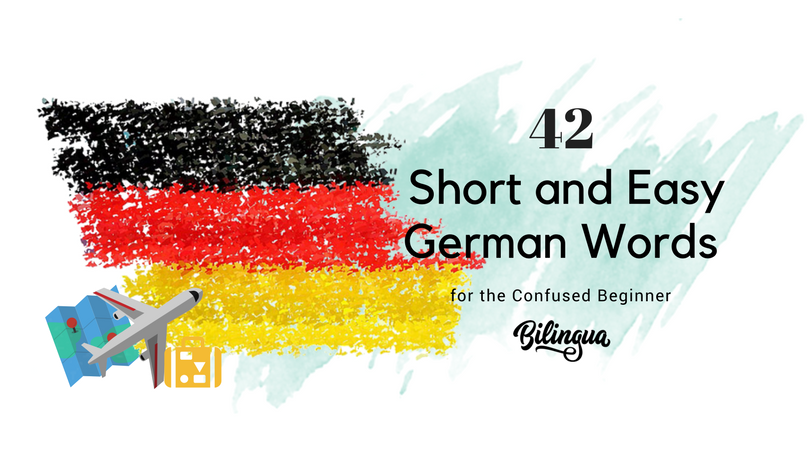
March 15, 2018
German is one of the most widely spoken languages in Europe. Aside from Germany, it’s spoken amongst people in Austria, Switzerland, Austria, Liechtenstein and Luxembourg. German has been considered the language of commerce and business in Europe. The Germans are proud engineers and have been are the forefront of manufacturing high-end mechanics for a while. German people are proud and honest. If you ask someone how they are in German then don’t be surprised if they give you a starkly honest answer! However, to the beginner, German words can get overwhelming! But fret not, there ARE short and easy German words that are easy to learn and use.
The language has often been considered hard to learn due to its 3 genders and long, winding words. It holds many similarities to English, too, though. German vocab will actually bear many resemblances to English. The words zeitgeist, angst and kindergarten are all German. English is the closest language to German after Dutch. Also, some people love getting their tongues round German’s super-long words. If it suits your talking style then you will love pronouncing German!
1. Be aware there is a standardised form of spoken German.
This means German spoken around the world will be very similar.
2. German words are designed to give indications on pronunciation.
The sounds are always the same, regardless of what word they appear in. German pronunciation is pretty rigid. Once you know your way around the way it works, it is very simple (even though the words look very complex!). Also, it’s obvious but German uses the same 26 letters as English with the simple additions of ß and three vowels with umlauts: ä, ö and ü.

3. Be aware Germans will correct you!
This is great, and they won’t do it rudely, either!
4. Focus on genders.
German has masculine, neuter and feminine genders. It’s very hard to predict what gender most nouns are. You can’t just not bother with them, either, as the meaning of the phrase changes according to the gender!
This list will give you a good idea of how German words resemble English in both obvious and subtle ways. Try and spot the similarities in how words are pronounced, too. For example, there are many words here ending in ‘en’.
Here’s a list of short and easy German words anyone can learn quickly.
42 Short and Easy German Words
- Hallo – Hello
- Danke – Thank You
- Nein – No
- Ja – Yes
- Lecker – Delicious
- Woche – week
- Heute – today
- Morgen – tomorrow
- Gestern – yesterday
- Machen – do
- Gehen – go
- Kommen – come
- Lachen – laugh
- Good – gut
- Schön – beautiful
- Kaffee – coffee
- Bier – beer
- Tee – tea
- Wein – wine
- Wasser – water
- Lamm – lamb
- Fisch – fish
- Nett – nice
- Sauber – clean
- Fein – fine
- Lieb – dear
- Liebe – love
- Komisch – funny
- Klasse – great
- Hoch – high
- Prima – fantastic
- Stark – Strong
- Lang – long
- Hell – bright
- Fähig – capable
- Kurz – short
- Klein – small
- Groß – Big
- Wunderbar – wonderful
- Ratte – rat
- Dunkel – dark
- Bye – Tschüss
Check out these articles to up your language learning game:
The Best Apps to Learn Arabic for Free
Ordering Food in Spanish – How Not to Starve! [INFOGRAPHIC]
How to Say Hello in 100 Languages
Scientists analyzed texts in German and found that only 500 of the most frequent words (listed below) cover about 70% of the words for everyday communication in German.
You can hide words or translate them, but after clicking on the hidden word, show it again and thereby you can check yourself.
| № | word | translate |
|---|---|---|
| 1 |
I |
ich |
| 2 |
the |
das |
| 3 |
to |
zu |
| 4 |
a |
ein |
| 5 |
and |
und |
| 6 |
that |
Das |
| 7 |
of |
von |
| 8 |
what |
Was |
| 9 |
we |
wir |
| 10 |
me |
mir |
| 11 |
he |
er |
| 12 |
for |
zum |
| 13 |
my |
meine |
| 14 |
on |
auf |
| 15 |
have |
haben |
| 16 |
do |
tun |
| 17 |
was |
war |
| 18 |
no |
Nein |
| 19 |
not |
nicht |
| 20 |
be |
Sein |
| 21 |
are |
sind |
| 22 |
know |
kennt |
| 23 |
can |
kann |
| 24 |
but |
aber |
| 25 |
all |
alle |
| 26 |
so |
damit |
| 27 |
just |
gerade |
| 28 |
there |
Dort |
| 29 |
here |
Hier |
| 30 |
they |
Sie |
| 31 |
like |
mögen |
| 32 |
get |
erhalten |
| 33 |
she |
sie |
| 34 |
go |
gehen |
| 35 |
if |
wenn |
| 36 |
right |
Recht |
| 37 |
out |
aus |
| 38 |
about |
Über |
| 39 |
up |
oben |
| 40 |
at |
beim |
| 41 |
him |
ihm |
| 42 |
now |
jetzt |
| 43 |
one |
einer |
| 44 |
come |
Kommen Sie |
| 45 |
well |
Gut |
| 46 |
her |
ihr |
| 47 |
how |
Wie |
| 48 |
will |
werden |
| 49 |
want |
wollen |
| 50 |
think |
Überlegen |
| 51 |
as |
wie |
| 52 |
see |
sehen |
| 53 |
good |
gut |
| 54 |
who |
WHO |
| 55 |
why |
Warum |
| 56 |
from |
von |
| 57 |
let |
Lassen |
| 58 |
his |
seine |
| 59 |
yes |
Ja |
| 60 |
when |
wann |
| 61 |
going |
gehen |
| 62 |
time |
Zeit |
| 63 |
an |
ein |
| 64 |
okay |
okay |
| 65 |
back |
zurück |
| 66 |
look |
aussehen |
| 67 |
us |
uns |
| 68 |
would |
würde |
| 69 |
them |
Sie |
| 70 |
where |
wo |
| 71 |
were |
wurden |
| 72 |
take |
nehmen |
| 73 |
then |
dann |
| 74 |
had |
hätten |
| 75 |
or |
oder |
| 76 |
been |
gewesen |
| 77 |
our |
unsere |
| 78 |
tell |
sagen |
| 79 |
really |
Ja wirklich |
| 80 |
man |
Mann |
| 81 |
some |
etwas |
| 82 |
say |
sagen |
| 83 |
could |
könnte |
| 84 |
by |
durch |
| 85 |
need |
brauchen |
| 86 |
something |
etwas |
| 87 |
has |
hat |
| 88 |
too |
zu |
| 89 |
more |
Mehr |
| 90 |
way |
Weg |
| 91 |
down |
Nieder |
| 92 |
make |
machen |
| 93 |
very |
sehr |
| 94 |
never |
noch nie |
| 95 |
only |
nur |
| 96 |
people |
Menschen |
| 97 |
over |
Über |
| 98 |
because |
da |
| 99 |
little |
wenig |
| 100 |
please |
Bitte |
| 101 |
love |
Liebe |
| 102 |
should |
sollte |
| 103 |
mean |
bedeuten |
| 104 |
said |
sagte |
| 105 |
sorry |
Es tut uns leid |
| 106 |
give |
geben |
| 107 |
off |
aus |
| 108 |
thank |
danken |
| 109 |
any |
irgendein |
| 110 |
two |
zwei |
| 111 |
even |
sogar |
| 112 |
much |
viel |
| 113 |
sure |
sicher |
| 114 |
thing |
Ding |
| 115 |
these |
diese |
| 116 |
help |
Hilfe |
| 117 |
first |
zuerst |
| 118 |
into |
in |
| 119 |
anything |
etwas |
| 120 |
still |
immer noch |
| 121 |
find |
finden |
| 122 |
life |
Leben |
| 123 |
nothing |
nichts |
| 124 |
sir |
Herr |
| 125 |
day |
Tag |
| 126 |
God |
Gott |
| 127 |
work |
Arbeit |
| 128 |
their |
ihr |
| 129 |
again |
nochmal |
| 130 |
maybe |
könnte sein |
| 131 |
must |
Muss |
| 132 |
before |
Vor |
| 133 |
other |
andere |
| 134 |
wait |
warten |
| 135 |
stop |
halt |
| 136 |
call |
Anruf |
| 137 |
after |
nach |
| 138 |
talk |
sich unterhalten |
| 139 |
away |
Weg |
| 140 |
than |
als |
| 141 |
home |
Zuhause |
| 142 |
night |
Nacht |
| 143 |
put |
stellen |
| 144 |
great |
groß |
| 145 |
those |
jene |
| 146 |
last |
letzte |
| 147 |
better |
besser |
| 148 |
everything |
alles |
| 149 |
told |
erzählte |
| 150 |
new |
Neu |
| 151 |
always |
immer |
| 152 |
keep |
behalten |
| 153 |
long |
lange |
| 154 |
leave |
verlassen |
| 155 |
does |
tut |
| 156 |
money |
Geld |
| 157 |
around |
um |
| 158 |
name |
Name |
| 159 |
place |
Ort |
| 160 |
ever |
je |
| 161 |
feel |
Gefühl |
| 162 |
father |
Vater |
| 163 |
guy |
Kerl |
| 164 |
made |
gemacht |
| 165 |
old |
alt |
| 166 |
which |
welche |
| 167 |
big |
groß |
| 168 |
lot |
Menge |
| 169 |
hello |
Hallo |
| 170 |
nice |
nett |
| 171 |
believe |
glauben |
| 172 |
girl |
Mädchen |
| 173 |
someone |
jemand |
| 174 |
fine |
fein |
| 175 |
kind |
nett |
| 176 |
house |
Haus |
| 177 |
every |
jeder |
| 178 |
through |
durch |
| 179 |
being |
Sein |
| 180 |
course |
Kurs |
| 181 |
stay |
bleibe |
| 182 |
left |
links |
| 183 |
dad |
Papa |
| 184 |
enough |
genug |
| 185 |
came |
kam |
| 186 |
may |
kann |
| 187 |
mother |
Mutter |
| 188 |
wrong |
falsch |
| 189 |
world |
Welt |
| 190 |
bad |
Schlecht |
| 191 |
might |
könnte |
| 192 |
three |
drei |
| 193 |
today |
heute |
| 194 |
listen |
Hör mal zu |
| 195 |
another |
Ein weiterer |
| 196 |
understand |
verstehen |
| 197 |
hear |
hören |
| 198 |
remember |
merken |
| 199 |
ask |
Fragen |
| 200 |
own |
besitzen |
| 201 |
same |
gleich |
| 202 |
show |
Show |
| 203 |
else |
sonst |
| 204 |
kill |
töten |
| 205 |
found |
gefunden |
| 206 |
next |
Nächster |
| 207 |
care |
Pflege |
| 208 |
car |
Auto |
| 209 |
son |
Sohn |
| 210 |
try |
Versuchen |
| 211 |
woman |
Frau |
| 212 |
went |
ging |
| 213 |
dead |
tot |
| 214 |
many |
viele |
| 215 |
mind |
Verstand |
| 216 |
friend |
Freund |
| 217 |
best |
Beste |
| 218 |
mom |
Mama |
| 219 |
hell |
Hölle |
| 220 |
morning |
Morgen |
| 221 |
boy |
Junge |
| 222 |
together |
zusammen |
| 223 |
yourself |
du selber |
| 224 |
job |
Job |
| 225 |
saw |
sah |
| 226 |
family |
Familie |
| 227 |
real |
echt |
| 228 |
without |
ohne |
| 229 |
baby |
Baby |
| 230 |
room |
Zimmer |
| 231 |
already |
bereits |
| 232 |
move |
Bewegung |
| 233 |
most |
die meisten |
| 234 |
live |
Leben |
| 235 |
miss |
Fräulein |
| 236 |
actually |
tatsächlich |
| 237 |
shit |
Scheisse |
| 238 |
both |
beide |
| 239 |
once |
Einmal |
| 240 |
ready |
bereit |
| 241 |
head |
Kopf |
| 242 |
used |
benutzt |
| 243 |
idea |
Idee |
| 244 |
knew |
wusste |
| 245 |
hold |
halt |
| 246 |
happy |
glücklich |
| 247 |
door |
Tür |
| 248 |
such |
eine solche |
| 249 |
brother |
Bruder |
| 250 |
also |
ebenfalls |
| 251 |
pretty |
ziemlich |
| 252 |
bit |
bisschen |
| 253 |
took |
dauerte |
| 254 |
yet |
noch |
| 255 |
men |
Männer |
| 256 |
whole |
ganze |
| 257 |
start |
Start |
| 258 |
use |
verwenden |
| 259 |
while |
während |
| 260 |
since |
schon seit |
| 261 |
wife |
Ehefrau |
| 262 |
guess |
vermuten |
| 263 |
tomorrow |
Morgen |
| 264 |
matter |
Angelegenheit |
| 265 |
meet |
Treffen |
| 266 |
bring |
bringen |
| 267 |
tonight |
heute Abend |
| 268 |
everyone |
jeder |
| 269 |
run |
Lauf |
| 270 |
hard |
schwer |
| 271 |
alone |
allein |
| 272 |
myself |
mich selber |
| 273 |
school |
Schule |
| 274 |
end |
Ende |
| 275 |
saying |
Sprichwort |
| 276 |
phone |
Telefon |
| 277 |
play |
abspielen |
| 278 |
problem |
Problem |
| 279 |
few |
wenige |
| 280 |
ago |
vor |
| 281 |
open |
öffnen |
| 282 |
anyone |
jemand |
| 283 |
hope |
Hoffnung |
| 284 |
face |
Gesicht |
| 285 |
until |
bis |
| 286 |
lost |
hat verloren |
| 287 |
police |
Polizei |
| 288 |
excuse |
Entschuldigung |
| 289 |
turn |
Wende |
| 290 |
business |
Geschäft |
| 291 |
case |
Fall |
| 292 |
die |
sterben |
| 293 |
heart |
Herz |
| 294 |
soon |
bald |
| 295 |
each |
jeder |
| 296 |
worry |
Sorge |
| 297 |
later |
später |
| 298 |
year |
Jahr |
| 299 |
watch |
beobachten |
| 300 |
music |
Musik- |
| 301 |
hand |
Hand |
| 302 |
probably |
wahrscheinlich |
| 303 |
beautiful |
wunderschönen |
| 304 |
doctor |
Arzt |
| 305 |
sit |
sitzen |
| 306 |
eat |
Essen |
| 307 |
thinking |
Denken |
| 308 |
young |
jung |
| 309 |
second |
zweite |
| 310 |
water |
Wasser |
| 311 |
person |
Person |
| 312 |
part |
Teil |
| 313 |
late |
spät |
| 314 |
stuff |
Zeug |
| 315 |
exactly |
genau |
| 316 |
under |
unter |
| 317 |
death |
Tod |
| 318 |
minute |
Minute |
| 319 |
pay |
Zahlen |
| 320 |
crazy |
verrückt |
| 321 |
forget |
vergessen |
| 322 |
everybody |
jeder |
| 323 |
kid |
Kind |
| 324 |
change |
Veränderung |
| 325 |
gave |
gab |
| 326 |
happen |
geschehen |
| 327 |
damn |
Verdammt |
| 328 |
five |
fünf |
| 329 |
drink |
Getränk |
| 330 |
far |
weit |
| 331 |
its |
es ist |
| 332 |
whatever |
wie auch immer |
| 333 |
shut |
geschlossen |
| 334 |
hit |
schlagen |
| 335 |
easy |
einfach |
| 336 |
check |
prüfen |
| 337 |
deal |
Deal |
| 338 |
different |
anders |
| 339 |
means |
meint |
| 340 |
point |
Punkt |
| 341 |
inside |
Innerhalb |
| 342 |
somebody |
jemand |
| 343 |
mine |
Bergwerk |
| 344 |
body |
Körper |
| 345 |
afraid |
Angst |
| 346 |
sleep |
Schlaf |
| 347 |
chance |
Chance |
| 348 |
dear |
sehr geehrter |
| 349 |
quite |
ganz |
| 350 |
four |
vier |
| 351 |
anyway |
wie auch immer |
| 352 |
close |
schließen |
| 353 |
party |
Party |
| 354 |
fun |
Spaß |
| 355 |
against |
gegen |
| 356 |
word |
Wort |
| 357 |
important |
wichtig |
| 358 |
set |
einstellen |
| 359 |
shall |
soll |
| 360 |
story |
Geschichte |
| 361 |
number |
Nummer |
| 362 |
daughter |
Tochter |
| 363 |
least |
am wenigsten |
| 364 |
hurt |
verletzt |
| 365 |
wish |
Wunsch |
| 366 |
moment |
Moment |
| 367 |
fight |
Kampf |
| 368 |
week |
Woche |
| 369 |
husband |
Mann |
| 370 |
rest |
sich ausruhen |
| 371 |
married |
verheiratet |
| 372 |
fire |
Feuer |
| 373 |
game |
Spiel |
| 374 |
nobody |
niemand |
| 375 |
children |
Kinder |
| 376 |
side |
Seite |
| 377 |
stand |
Stand |
| 378 |
read |
lesen |
| 379 |
though |
obwohl |
| 380 |
cut |
Schnitt |
| 381 |
sister |
Schwester |
| 382 |
between |
zwischen |
| 383 |
child |
Kind |
| 384 |
speak |
sprechen |
| 385 |
women |
Frauen |
| 386 |
behind |
hinter |
| 387 |
almost |
fast |
| 388 |
truth |
Wahrheit |
| 389 |
blood |
Blut |
| 390 |
able |
fähig |
| 391 |
lady |
Dame |
| 392 |
anymore |
nicht mehr |
| 393 |
shot |
Schuss |
| 394 |
reason |
Grund |
| 395 |
trouble |
Ärger |
| 396 |
break |
brechen |
| 397 |
war |
Krieg |
| 398 |
city |
Stadt |
| 399 |
walk |
gehen |
| 400 |
town |
Stadt, Dorf |
| 401 |
trust |
Vertrauen |
| 402 |
office |
Büro |
| 403 |
question |
Frage |
| 404 |
yours |
deine |
| 405 |
welcome |
herzlich willkommen |
| 406 |
high |
hoch |
| 407 |
couple |
Paar |
| 408 |
half |
halb |
| 409 |
cool |
cool |
| 410 |
free |
kostenlos |
| 411 |
either |
entweder |
| 412 |
power |
Leistung |
| 413 |
bye |
Tschüss |
| 414 |
buy |
Kaufen |
| 415 |
honey |
Honig |
| 416 |
front |
Vorderseite |
| 417 |
team |
Mannschaft |
| 418 |
answer |
Antworten |
| 419 |
gun |
Gewehr |
| 420 |
line |
Linie |
| 421 |
send |
senden |
| 422 |
news |
Nachrichten |
| 423 |
stupid |
blöd |
| 424 |
bed |
Bett |
| 425 |
hurry |
Eile |
| 426 |
full |
voll |
| 427 |
save |
speichern |
| 428 |
sometimes |
manchmal |
| 429 |
become |
werden |
| 430 |
along |
entlang |
| 431 |
hate |
Hass |
| 432 |
food |
Essen |
| 433 |
outside |
draußen |
| 434 |
light |
Licht |
| 435 |
dog |
Hund |
| 436 |
country |
Land |
| 437 |
clear |
klar |
| 438 |
order |
Auftrag |
| 439 |
fact |
Tatsache |
| 440 |
lord |
Herr |
| 441 |
captain |
Kapitän |
| 442 |
six |
sechs |
| 443 |
hot |
heiß |
| 444 |
funny |
komisch |
| 445 |
black |
schwarz |
| 446 |
alive |
am Leben |
| 447 |
pick |
wählen |
| 448 |
feeling |
Gefühl |
| 449 |
cause |
Ursache |
| 450 |
ahead |
voraus |
| 451 |
lose |
verlieren |
| 452 |
king |
König |
| 453 |
plan |
planen |
| 454 |
dinner |
Abendessen |
| 455 |
sort |
Sortieren |
| 456 |
boss |
Chef |
| 457 |
alright |
in Ordung |
| 458 |
promise |
versprechen |
| 459 |
safe |
sicher |
| 460 |
book |
Buch |
| 461 |
sent |
geschickt |
| 462 |
white |
Weiß |
| 463 |
hour |
Stunde |
| 464 |
anybody |
irgendjemand |
| 465 |
small |
klein |
| 466 |
perfect |
perfekt |
| 467 |
special |
Besondere |
| 468 |
himself |
selbst |
| 469 |
perhaps |
vielleicht |
| 470 |
serious |
ernst |
| 471 |
sick |
krank |
| 472 |
company |
Unternehmen |
| 473 |
uncle |
Onkel |
| 474 |
poor |
Arm |
| 475 |
red |
rot |
| 476 |
past |
Vergangenheit |
| 477 |
earth |
Erde |
| 478 |
shoot |
schießen |
| 479 |
touch |
berühren |
| 480 |
sound |
Klang |
| 481 |
top |
oben |
| 482 |
cannot |
kann nicht |
| 483 |
win |
Sieg |
| 484 |
glad |
froh |
| 485 |
control |
Steuerung |
| 486 |
human |
Mensch |
| 487 |
drive |
Fahrt |
| 488 |
hair |
Haar |
| 489 |
luck |
Glück |
| 490 |
murder |
Mord |
| 491 |
air |
Luft |
| 492 |
ten |
zehn |
| 493 |
finally |
endlich |
| 494 |
fast |
schnell |
| 495 |
cold |
kalt |
| 496 |
seem |
scheinen |
| 497 |
hospital |
Krankenhaus |
| 498 |
street |
Straße |
| 499 |
hang |
hängen |
| 500 |
dance |
tanzen |
| № | word | translate |
500 out of 500 words
Other exercises for memorizing words
- Choose a translation
- Reverse translation
- Write a translation
- Spell the words
- Words from context
- Flash cards
- Listen and choose
- Sprint on time




